Emerson File
User Manual: Emerson s - Owner's Manuals | Emerson Radio
Open the PDF directly: View PDF ![]() .
.
Page Count: 35

7
7,0 CUBIC FOOT
t
L
, IWW{91 ogP
Visit our web site at "www.emersonradio.com"
Mr rcRowvE ovEN
WITH
OMNI WAVE COOKING SYSTEM,*
OWNER'S MANUAL
AND
COOKI NG GUIDE

a
,-4
4=-:*
PRECAUTIONS TO AVOID
POSSIBLE EXPOSURE TO EXCESSIVE
MICROWAVE ENERGY
(a) Do not attempt to operate this oven with the door open since open-door operation can
result in harmful exposure to microwave energy.
It is important not to defeat or tamper with the safety interlocks.
(b) Do not place any object between the oven frcjnt face and the door or allow soil or cleaner
residue to accumulate on sealing surfaces.
(c) Do not operate the oven if it is damaged.
It is particularly important that the oven door closes properly and that there is no damage
to the: (1) door (bent), (2) hinges and latches (broken or loosened), (3) door seals and
sealing surfaces.
(d) The oven should not be adjusted or repaired by anyone except properly qualified service
personnel.
CONTENTS
Precautions to Avoid Possible Exposure to
Excessive Microwave Energy.. ........1
lmportant Safety lnstructions.. ....,.....2
Safety Precautions.. ..........3
Grounding lnstructions .......4
lnstallation..... ...........4
Care of Your Microwave Oven .......5
How to Use Your Microwave Oven Safely. ............s
Feature Locations...... ........6
Operation Procedure...... ....,,....7
Controls ..... ..... g
Setting The Clock... ..........g
Auto Weight Defrosting .... .......9
Cooking in One Stage .. .. ... ..... 1 0
Cooking in Two and Three Stages.,... ..........1 1
Plus Time .,......12
Auto Weight Defrosting and Cooking
in Two Stages .,.12
Popcorn ....13
Beverages.... .....13
Potatoes ..... 1 1
Pizza. .........11
Dinner Plate. ......1 s
Hold Warm .........16
Child Lock. ...,.....17
To Stop the Oven While it is Operating ........11
Cooking Guide .........1g
The Principles of Microwave Cooking ....18
The Emerson Omni Wave
Cooking SystemT . ... .. ... 1 B
Food Characteristics ........ 1 g
Microwave Techniques ..20
Auto Weight Defrosting..... ........21
Popping Popcorn ......22
Reheating ... ......22
Beverage Reheating.. ........23
Hold Warm ........23
Hot Snacks and Appetizers ... ..23
Meats ........23
Poultry ........25
Seafood ...2s
Eggs & Cheese..... ....27
Vegetables . .. .. ... .. ,28
Soups ...28
Sauces. ......29
Casseroles... .....29
Sandwiches, lncluding Hamburgers and
Hot Dogs..... ........30
Pastas & Grains ........30
Convenience Foods ........31
Beverages... ........31
Desserts.... .:..... ........32
Weight & Measure Conversion Chart ,....32
Specifications ......33
Before You Call for Service ......33

IMPORTANT SAFETY
INSTRUCTIONS
When using electricalappliances, basic safety precautions should be followed, including the following:
WARNING: - To reduce the risk ol bums, electric shock, fire, injury to peftions or exposure lo excessive microwave energy:
2
3
4
5
6
Read all instructions before using this appliance.
Read and follow the specific .'PRECAUTIONS T0
AVOID POSSIBLE EXPOSURE TO EXCESSIVE
MICRO-WAVE ENERGY" found on page 1.
This appliance must be grounded. Connect only to a
properly grounded outlet. See "GROUNDING
|NSTRUCT|ONS" found on page 4.
lnstall or locate this appliance only in accordance
with the provided installation instructions.
Some products such as whole eggs and sealed
containers-for example, closed glass jars - may
explode and should not be heated in this oven.
Use this appliance only for its intended use as
described in this manual. Do not use corrosive
chemicals or vapors in this appliance. This type of
oven is specifically designed to heat, cook, or dry
food. lt is not designed for industrial or laboratory
use.
As with any appliance, close supervision is
necessary when used by children.
Do not operate this appliance if it has a damaged
cord or plug, if it is not working properly, or if it has
been damaged or dropped.
This appliance should be serviced only by qualified
service personnel. Contact the nearest authorized
service facility for examination, repair or adjustment.
Do not cover or block any openings on this
appliance.
1 1 Do not store this appliance outdoors. Do not use this
I I product near water-for example, near a kitchen sink,
in a wet basement, or near a swimming pool, and the
like. Do not use outdoors.
12 Do not immerse cord or plug in water.
1 3 Keep cord away from heated surfaces.
1 6 tt reduce the risk of fire in the oven cavity:
1 4 Do not let cord hang over edge of table or counter.
{ R When cleaning surfaces of door and oven that come
I \, together when closing the door, use only mild, non-
abrasive soaps or detergents applied with a sponge
or soft cloth.
(a) Do not overcook food. Carefully attend
appliance if paper, plastic, or other combustible
materials are placed inside the oven to facilitate
cooking.
(b) Remove wire twist-ties from paper or plastic
bags before placing bag in oven.
(c) lf materials inside the oven should ignite, keep
oven door closed, turn oven off, and disconnect
the power cord, or shut off power at the fuse or
circuit breaker panel.
(d) Do not use the cavity for storage purposes. Do
not leave paper products, cooking utensils, or
food in the cavity when not in use.
1 a Do not use this microwave oven to heat corrosive
I I chemicals (f or example, sulf ides and chlorides).
Vapors from such corrosive chemicals may interact
with the contact and springs of the safety interlock
switches thereby rendering them inoperable.
7
B
9
10
SAVE THESE INSTRUCTIONS

SAFETY PRECAUTIONS
General Use
{ Do NOT attempt to tamper with or make any
I adjustments or repairs to door, control panel or any
other part of the oven. Do NOT remove outer panel from
oven. Repairs should only be done by qualified seruice
personnel.
O Do NOT operate the oven empty, The microwave
I energy will reflect continuously throughout the oven if
no food or water is present to absorb energy.
e ff a fire occurs in the oven, touch the CLEAR/PAUSE
tJ pad and LEAVE THE DOOH CLOSED. Disconnect the
power cord, or shut off power at the fuse or circuit
breaker panel.
A Do NOT attempt to dry clothes, newspapers or other
-T materials in the oven. They may catch on fire.
tr Do NOT use recycled paper products, as they may
\, contain impurities which may cause sparks and/or fires
when used.
D Do NOT hit or strike control panel. Damage to controls
O may occur.
7 Avoid inserting nails, wire, etc. through any holes in the
I unit during operation. Never insert a wire, nail or any
other metal objects through the holes on the cavity or
any other holes or gaps, because such objects may
cause electric shock and microwave leakage.
Paper Products
1 Paper towels and napkins - Use for shortterm heating
I and covering. They absorb excess moisture and prevent
spattering. Do not use recycled paper towels which may
contain metal and can catch fire.
O Paper plates and cups - Use for short-term heating at
I low temperatures. Do not use recycled paper which
may contain metal and can catch fire.
Utensils
{ METAL CONTAINERS or dishes with metallic rims
I should not be used. Arcing may occur.
n M ETAL TWIST-TIES may not be used in the
I microwave oven.
r'l Do NOT use SEALED JARS or NARROW NECK
\t bottles for cooking or reheating. They may shatter.
A DO NOT use CONVENTIONAL THERMO-METERS in
+ the microwave oven. They may cause arcing.
E Remove PLASTIC STORE WRAPS before cooking or
rl| defrosting foods in the oven.
A For FURTHER INFORMATION on proper cooking
\/ utensils, refer to the microwave cooking guide.
Food
{ Never use your microwave oven for HOME CANNING.
I The oven is not designed to permit proper canning.
lmproperly canned food may spoil and be dangerous to
consume.
O COOKING TIMES given in the cooking guide are
(. approximate. Factors that may affect cooking are
stafting temperature, altitude, volume, size and shape
of food and utensils used. As you become familiar with
the oven, you will be able to adjust for these factors.
A It iS better to UNDERCOOK RATHER THAN
\t OVERCOOK foods. lf food is undercooked, it can
always be returned to the oven for further cooking. lf
food is overcooked, nothing can be done. Always start
with minimum cooking times.
i SMALL QUANTITIES of food or foods with LOW
+ MOISTURE content can burn, dry out, or catch fire if
cooked too long.
tr Do NOT boil eggs in their shell. Pressure may build up
\, and the eggs may explode.
A Potatoes, apples, egg yolks, whole acorn squash and
\,l sausage are examples of food with NONPOROUS
SKINS. These must be pierced bef ore cooking to
prevent bursting.
7 POPCORN must be popped in a microwave corn
I popper. Microwave popped corn produces a lower yield
than conventional popping. Do not use oven for popcorn
unless popped in a microwave approved popcorn utensil
or unless it's commercially packaged and recommended
especially for microwave ovens. Do not use oil unless
specified by the manufacturer.
f; Do NOT attempt to deep fat fry in your oven.
o
n HEATED LIQUIDS can ERUPT if not mixed with air. Do
V not heat liquids in your microwave oven without first
stirring.

.i;
GROUNDING INSTRUCTIONS
This appliance must be grounded. ln the event of an electrical short circuit, grounding reduces
- the risk of electric shock by providing an escape wire for the electric current. This aplliance is
equipped with a cord having a grounding wire with a grounding plug. The plug must be inserted
into an outlet that is properly installed and grounded.
W#RNlNGJmFroper use#:iljelgrounding plug canlrcsult in a risk oJ electrib shock. Consult a quatitieo eleCtrician or
service person if the grounding instructions are not complete[ understood,, or il doubt exists as to whether the
appliance is pmperly grounded.
lf it is necessary to use an odension cord, use only a three wire exlension cord that has a three blade
extension cord should be equal to or greater than the electrical rating of the appliance.
INSTALLATION
1. Steady, flat location: When positioning the microwave oven, it should be set on a flat, steady surface.
2. Ventilation: Do not block air vents. ll they are blocked during operation, the oven may overheat and eventually cause
oven failure. For proper ventilation, keep 3 inches of space between the oven's top, sides, rear and the area where the unit
is to be installed.
3. Radio and TV reception: Poor lelevision reception and radio interlerence may result if the oven is located close lo a
TV, radio, antenna, or antenna wire. Position the oven as far from them as possible.
4. Temperature and moisture: Keep the oven away from hot air, steam or splashing liquids when choosing a place to
locate it, otherwise, the unit's operation may be adversely affected, causing it to break down.
5. Power supply:
. Check your local power source. This microwave oven requires a 1 20V, 60Hz power supply.
. Use a receptacle that will accept the ground prong.
A. A short power supply cord is provided to reduce the risks resulting from becoming entangled in or tripping over a longer
cord,
B. Longer cord sets or extension cord are available and may be used it care is exercised in their use.
C. lf a long cord or extension cord is used, (1) the marked electrical rating ol the cord set or extension cord should be at
least as greal as the electrical rating of the appliance, (2) the extension cord must be a grounding-type 3-wire cord, and
(3) the longer cord should be ananged so that it will not drape over the counter top or tabletop where it can be pulled on
by children or tripped over unintentionally.
6. Examine the oven for any damage such as: Dents, a misaligned door, broken door or a dent in the cavity. ll any
of the above are visible, DO NOT INSTALL THE UNIT,
Notify the dealer immediately.
When::using a :3-pron$ed .plUg
3.pionged ,
R6.Ce.ptaCle
3.prohged
Plug, ,;
When using a grounding adapter, make
sure the receptacle box is fully grounded.
ReceptaCle
BoX Cwer,
Groundin$,L€ad

CARE OF YOUR MICROWAVE OVEN
I Disconnect the AC plug from the outlet before cleaning.
I
O Keep the inside of the oven clean. When food spatters
(. or spilled liquids adhere to oven walls, wipe with a damp
cloth. Mild detergent may be used if the oven gets very
dirty. The use of harsh detergent or abrasives is not
recommended.
e The outside oven surface should be cleaned with soap
t'l and water, rinsed and dried with a soft cloth. To prevent
damage to the operat-ing parts inside the oven, water
should not be allowed to seep into the ventilation slots.
A lf the Control Panel becomes wet, clean with a soft, dry
-f cloth. Do not use harsh detergents or abrasives on
Control Panel.
R lf steam accumulates on both sides of the oven door,
V wipe with a soft cloth. This may occur when the
microwave oven is operated under high humidity
conditions and this is not an indication of a malfunction
in the unit.
A lt is occasionally necessary to remove the glass tray for
\.l cleaning. Wash the tray in warm, sudsy water or in a
dishwasher.
7 The roller guide and oven cavity floor should be cleaned
I regularly to avoid excessive noise. Simply wipe the
bottom surface of the oven with miH detergent water or
window cleaner and dry. The roller guide may be
washed in mild, sudsy water or dishwater.
f| Be sure to replace the turntable and roller guide.
o
Roller Guide
Turntable Coupling & Beaning Washer
HOW TO USE YOUR MICROWAVE OVEN SAFELY
Although your oven is provided with safety features, it is important to observe the following:
a) lt is impoftant nol to defeat or tamper with safety interlocks.
b) Do not place any object between the oven lace and the door or allow residue to accumulate on sealing surfaces. Wipe the
sealing area lrequently with a mild detergent, rinse and wipe dry. Never use abrasive powders or pads.
c) When opened, the door must not be subjected to strain, for example, a child hanging on an open door or any load which
could cause the oven to fall fonrard and cause injury and damage the door. Do not operate the oven if it is damaged, until
it has been repaired by a qualified person. lt is particularly important that the oven door close properly and that there is no
damage to the:
i) Door (bent), ii) Hinges and Latches (broken or loosened), iii) Door seals and sealing surfaces.
d) The oven should not be adjusled or repaired by anyone except properly qualified service personnel.

FEATURE LOCATIONS
sffi
ffi
td46
tdfld
tdoto
@
\\frfla
eo+
e/0\\ POULTNY llEAI FISH
@@
@@
@tr
@
2.
1. Door latch When the door is closed, it will
automatically lock shut. lf the door is opened while the
oven is operating, the magnetron will automatically
shut off.
Door seal - The door seal maintains the
microwaves within the oven cavity and prevents
microwave leakage.
Oven cavity.
Spatter shield Protects the microwave outlet
from splashes of cooking foods.
Safety interlock system Prevents the oven
from operating while the door is opened.
Glass cooking tray Made of special heat
resistant glass. The tray must always be in proper
position before operating the oven. Do not cook food
directly on the tray.
7. Roller guide - Supports the glass cooking tray.
Must always be in proper position before operating the
oven.
8. Door screen - Allows viewing of food. The screen
is designed so that light can pass through, but not the
microwaves.
9. Plus Time Pad - Each touch adds 10 seconds to
count down cooking time.
10. ClearlPause pad - Used to stop the oven
operation or to delete the cooking data.
1 1 . Start Pad - Use to start a selected operation.
12. Door release button - Pushing this button stops
oven operation and opens the door.
13. LED display - Cooking time, power level, function
indicators and the present time are displayed.
14. Auto Weight Defrost pad -. Use to set the
desired def rosting category.
15. Beverage pad - Used to heat beverages.
16. Pizza pad - Touch to reheat precooked pizza.
17. Hold Warm pad - Used to keep the food warm
after cooking is compldted.
18. Power Level pad - Used to set the desired
cooking power level.
19. Number pads - Use these pads to select the
number for Stage 1, Stage 2 and Stage 3 cooking,
Snack & Reheat, present and Auto Weight Defrost
time and the cooking power level.
24. Potato pad - Touch to cook potatoes.
Dinner Plate pad - Used to reheat plated foods.
Popcorn pad - Used to cook popcorn.
21. Cook pad - Use to set the cooking time.
22. Clock pad - Touch to set the present time.
3.
4.
5.
6.

OPERATION PROCEDURE
This section lncludes Useful lnformation About oven operation
1. Plug the power supply cord into a standard 3-pronged 20 Amp, 120V AC, 60 Hz power outlet.
2. Alter placing the food in a suitable container, open the oven door and put it on the glass
tray. The glass tray and roller guide must always be in place during cooking.
3. Shut the door. Make sure that it is firmly closed.
2
3
When the oven door is opened, the light turns off. This is
standard procedure for the oven. There are no microwaves
being produced when the door is open.
The oven door can be opened at any time during operation by
pressing the Door Release button on the control panel. The
oven will automatically shut off. To restart the oven, close the
door and then press the START pad.
Each time a pad is touched, a beep will sound to acknowledge
the touch (except Child Lock feature). One of the function
pads must be touched before the number pads. Therefore, no
beep will sound if a number pad is touched before the function
pad.
The oven automatically cooks on high power (PL 10) unless
set to a lower power level.
The display will flash "0:00" when the oven is first plugged in.
The display shows "End" when the oven turns off. To return to
the time of day, touch the CLEAR/PAUSE pad or open the
oven door.
When the CLEAR/PAUSE pad is touched during oven
operation, the oven stops operating and all information is
retained. To erase all information (except the present time and
memory data), touch the CLEAR/PAUSE pad once more. lf
the oven door is opened during operation, all information is
retained.
lf the START pad is touched and the oven does not operate,
check the area between the door and the door seal for
obstructions and make sure the door is closed securely. The
oven will not start cooking until the door is completely closed
or the program has been reset. Make sure the Child Lock
feature is not turned on.
I cHtLD LocK
This safety feature prevents unwanted or unauthorized
use by small children or other people.
1. To lock the oven, touch the number pad "0" once
and then press the START pad five times. The
display will show "L 0C' and the oven will not
operate.
2. To unlock the oven, repeat the above procedure.
The oven display will return to the present time.
10 BEEP roNE
When a correct pad is touched, a beep tone (0.2 seconds
long) will be heard (except with Child Lock feature). lf a
pad is touched and no beep tone is heard, the unit has
not, or cannot accept the instruction(s).
At the end of the last cook cycle, the oven beeps 5 times,
turns off automatically and "End" appears in the display
window.
11DooR RELEASE
Opening the door during cooking will stop any cooking
process without cancelling any program. Cooking
resumes as soon as the door is closed and the START
pad is touched.
12TO CORRECT ANY TMPROPER PROGRAM
ENTRIES
A) Touch the CLEAR/PAUSE pad.
B) Repeat the desired program entry from the
beginning.
C) Any erroneous entries will cause the display to
show "Er/' (error) when the START pad is touched.
li aaiJ;;;; ift-;;;, B ilm e ; y. iFGii;I *'[] ffi *J i
r., ihto::the::.ebCtribal:o,utlet. ,',l
l, i*,,,.:. t..a:alr' _'-_ __;_____.: f
4
5
6
I

ADDITIONAL INFORMATION
1. You cannot program more than 99 minutes and 99 seconds in each stage.
,2. You cannot program for more than 6 lbs of poultry, 4 lbs of meat or 3 lbs of fish in the Auto Weight Defrost stage.
3. lf you open the oven door during cooking, be sure to touch the START pad to begin cooking again.
4. The oven door can be opened at any time while the oven is operating. lf the door is opened, the oven will stop and the display will
stop counting down the cooking time.
5. lf a function or program is selected, but nol started within one minute, the display returns to the present time and the program is
erased.
CONTROLS
SETTING THE CLOCK
When the oven is first plugged in, the display will flash "0:00" and a tone will sound. lf the AC
power ever goes off, the display will flash "0:00" when the power comes back on.
The display will flash "0:00" and a
tone will sound.
\\\//,/XO).1rl
XO)J)J
,///\\\
EXAMPLE: To set the time to "10:12",
touch tt1tt, tt0tt, "1","2" in sequence.
The display will show the numbers pressed
in the order you pressed them.
1. Press the Door Release button
to open the door. Touch the
Number pads to set the
cooorct present time.
\\\//,/
,//l
()-lo
(xo
The display will show the present time and
stops blinking. The 12 hour digital clock
allows you to set it lrom "1:00" to "12:59".
4. Touch the CLOCK pad.
NOTE: lflhe':oven:.ie,used betore thd pre$enltimeisset, the displaywill:show "0* afterthe cooking is completed and the U00r
is opened.
To reset present time in the display windout when the wen iC ott, toucn tne CLOCK pad. The colon starts blinking.
Enter the correct present time by lollowing theabove procedures.
i[: lI
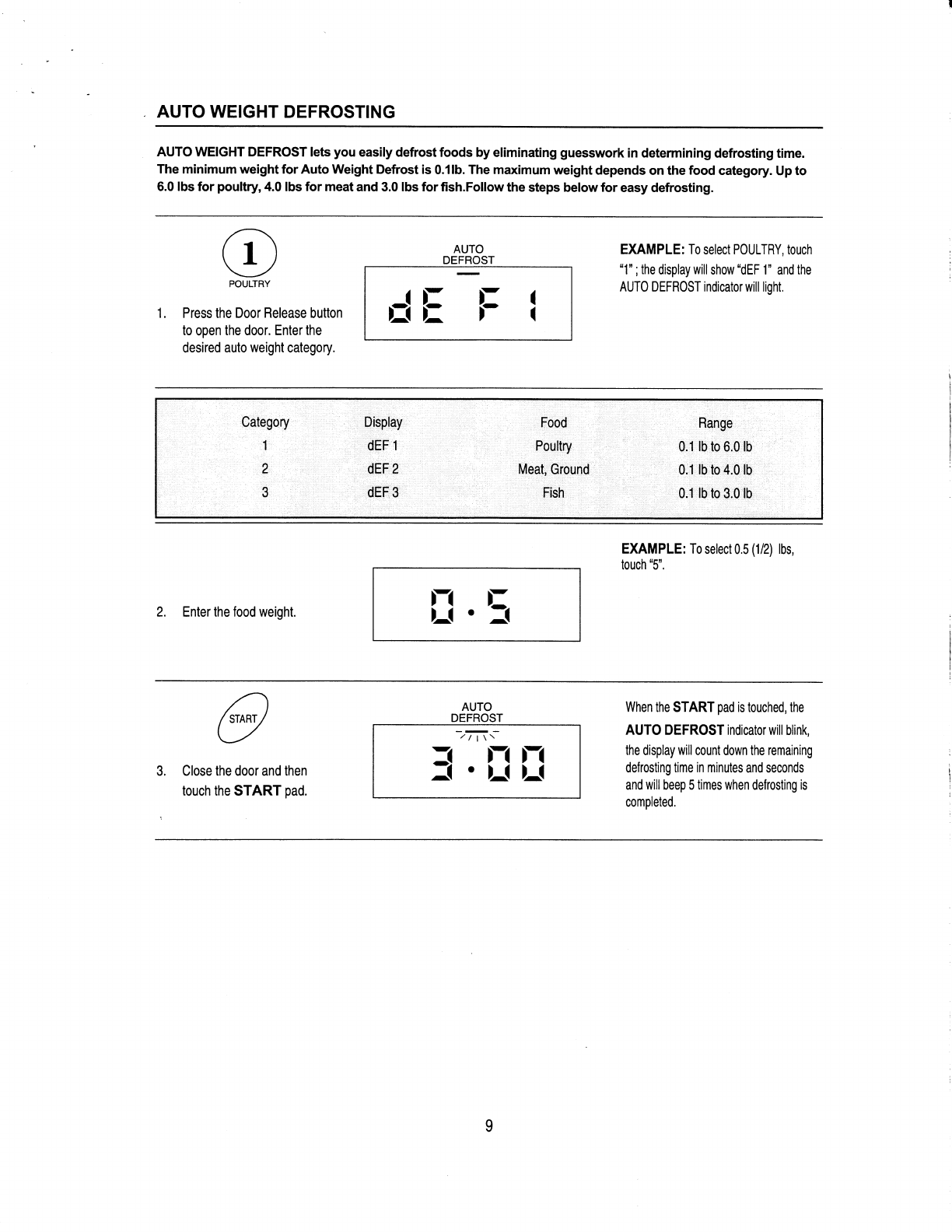
AUTO WEIGHT DEFROSTING
AUTO WEIGHT DEFROST lets you easily deftost foods by eliminating guesswork in determining defrosting time.
The mlnimum weight forAuto Weight Defrost is 0.11b. The maximum weight depends on the food category. Up to
6.0 lbs for poultry, 4.0 lbs for meat and 3.0 lbs for fish.Follow the steps below for easy deftosting.
O
1. Press the Door Release button
to open the door. Enter the
desired auto weight category.
AUTO
DEFROST EXAMPLE: To select POULTRY, touch
"1" ; the display will show -dEF 1" and the
AUTO DEFROST indicator will light,
TF F i
Category
1 1,,
2'
3
D,iSplay
0er r
CgF.,2
,d:EF::3..,
,, F6od
Poultry
Mbat, Giound
Fish
,., , Rangg ,..,,
0.:l lb,.to 6,0,lb
,0.1,lb.,,t0 4'0,1b
0.,:f I ;5..,.16, 3,0r,rlb
EXAMPLE: To select 0.5 (1/2) lbs,
touch "5".
2. Enter the food weight. [.r
AUTO
DEFROST When the START pad is touched, the
AUTO DEFROST indicator will blink,
the display will count down the remaining
defrosting time in minutes and seconds
and will beep 5 times when defrosting is
completed.
3. Close the door and then
touch the START pad.
// l\\
::o[[
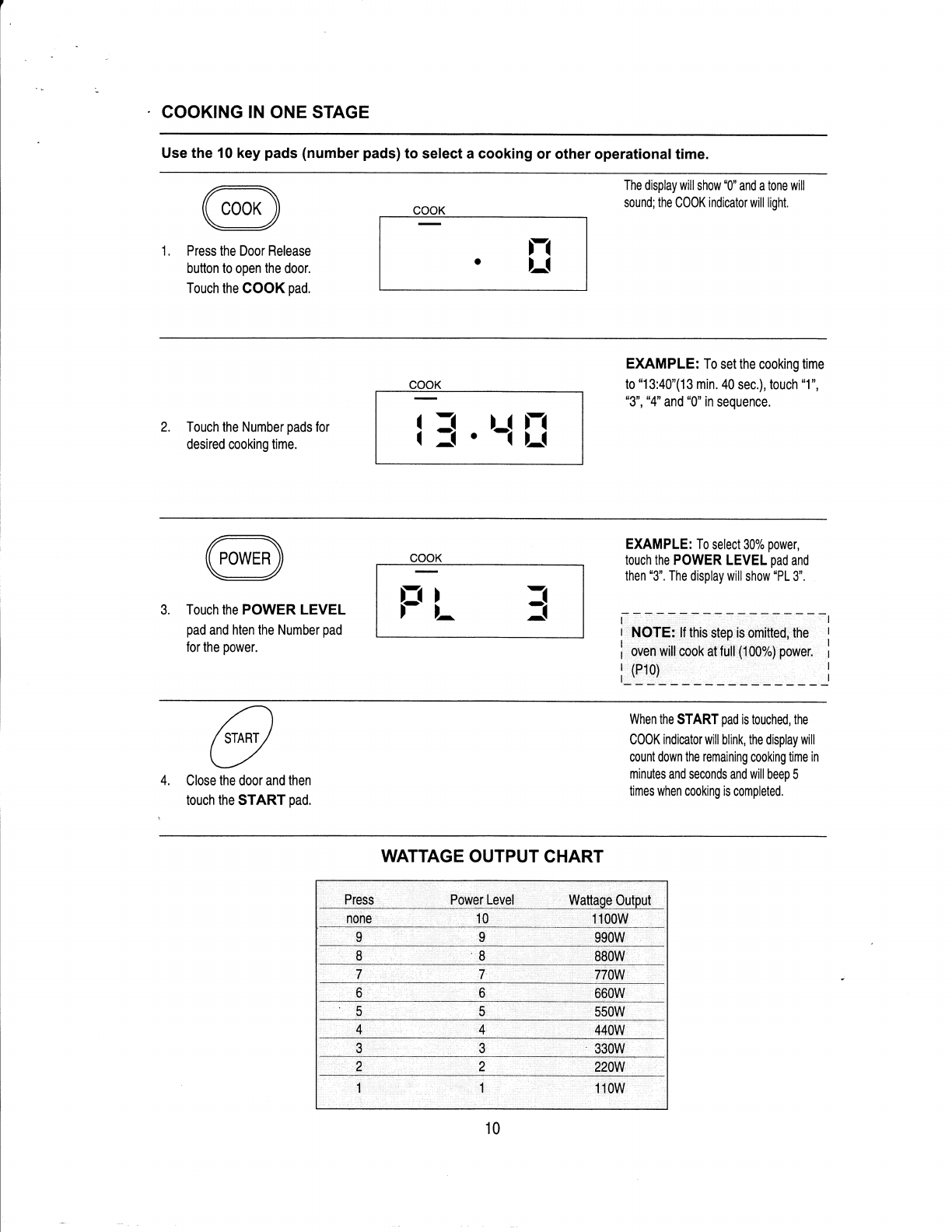
COOKING IN ONE STAGE
Use the 10 key pads (number pads) to select a cooking or other operational time.
The display will show "0" and a tone will
sound; the C00K indicator will light.
1. Press the Door Release
button to open the door.
Touch the COOK pad.
cooK
-rl
OL(
EXAMPLE: To set the cooking time
to "13:40"(13 min.40 sec.), touch "1",
"3"r"4" and t'0" in sequence.
2. Touch the Number pads for
desired cooking time.
cooK
Il .'{ [
cooK
F1 I
3. Touch the POWER LEVEL
pad and hten the Number pad
for the power.
EXAMPLE: To select 30% power,
touch the POWER LEVEL pad and
then "3". The display will show "PL 3".
il - = = -,,- - T -,- - - - - T - - -l
t NOTE: lf this step is omitted, the i
j oven will cook atfull (100%) power. i
l=(lt3).--. - ---.,--.-J
4. Close the door and then
touch the START pad.
When the START pad is touched, the
C00K indicator will blink, the display will
count down the remaining cooking time in
minutes and seconds and will beep 5
times when cooking is completed,
WATTAGE OUTPUT CHART
Pf0sS ,,,,,i 1..0 1,.,1..00ltl
,,8
770W
',, S
$$Q111 .
22:0W
1.1,0W
10
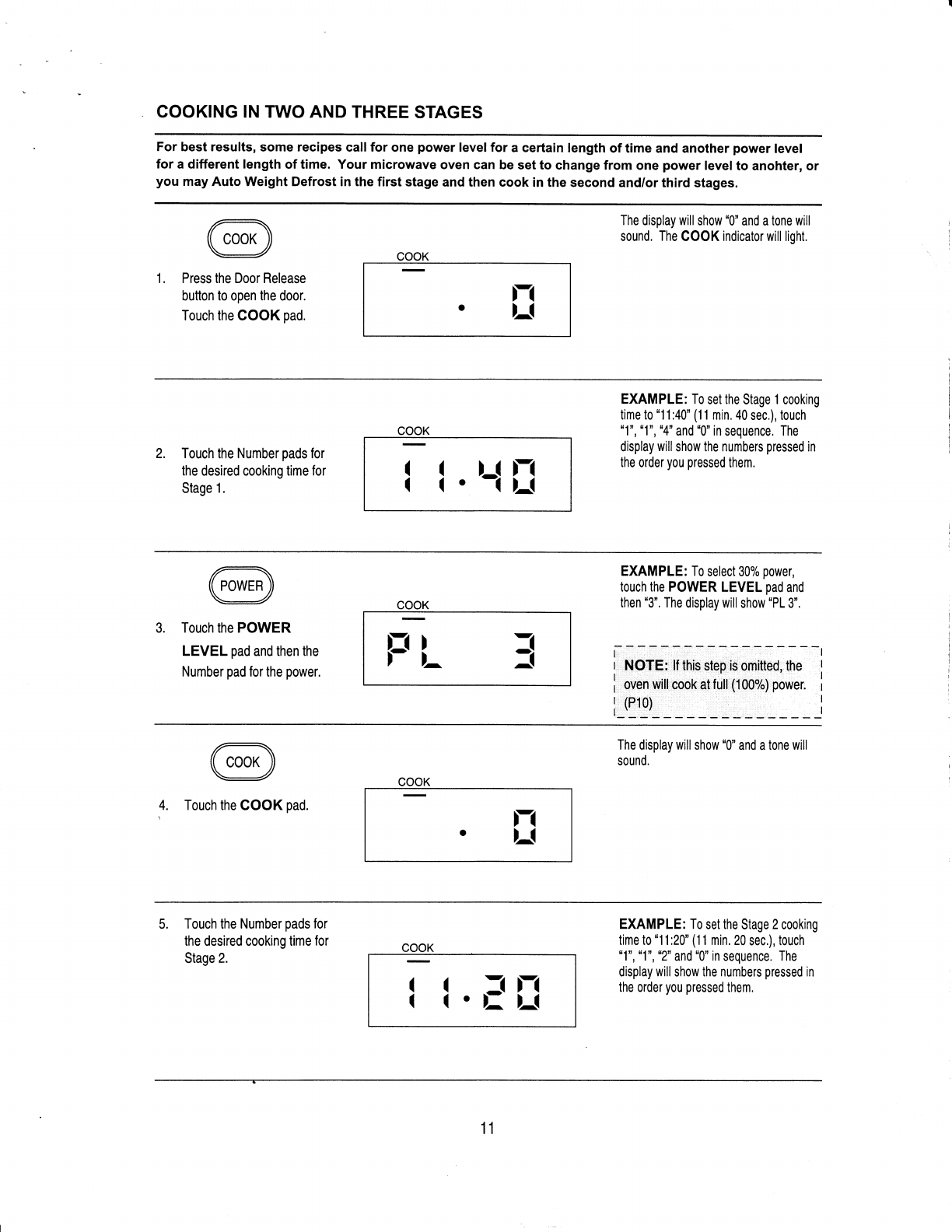
COOKING IN TWO AND THREE STAGES
For best results, some recipes call for one power level for a certain length of time and another power level
for a different length of time. Your microwave oven can be set to change from one power level to anohter, or
you may Auto Weight Defrost in the first stage and then cook in the second and/or third stages.
The display will show "0" and a tone will
sound. The GOOK indicator will light.
1. Press the Door Release
button to open the door.
Touch the GOOK pad.
cooK
-)-1
ox
EXAMPLE: To set the Stage 1 cooking
time t0 "11:40" (11 min. 40 sec.), touch
u1", "1","4" and 00" in sequence, Thg
display will show the numbers pressed in
the order you pressed them.
2. Touch the Number pads for
the desired cooking time for
Stage 1.
cooK
! ! rJrt
I to-tLI
EXAMPLE: To select 30% power,
touch the POWER LEVEL pad and
then u3". The display will show UPL 3".
3. Touch the POWER
LEVEL pad and then the
Number pad for the power. NIOTE :,,::lf 161a, ste.p:... i$ ,0rnitted, 'th e
oven will cook at full (100%) power.
(P10)
cooK
{;- I
The display will show 00" and a tone will
sound.
4. Touch the COOK pad.
cooK
-).1
ox
5. Touch the Number pads for
the desired cooking time for
Stage 2.
EXAMPLE: fo set the Stage 2 cooking
time to "11:20" (1 1 min. 20 sec.), touch
01", "1",u2" and "0" in sequence. Thg
display will show the numbers pressed in
the order you pressed them.
cooK
,t
( (OTX
11
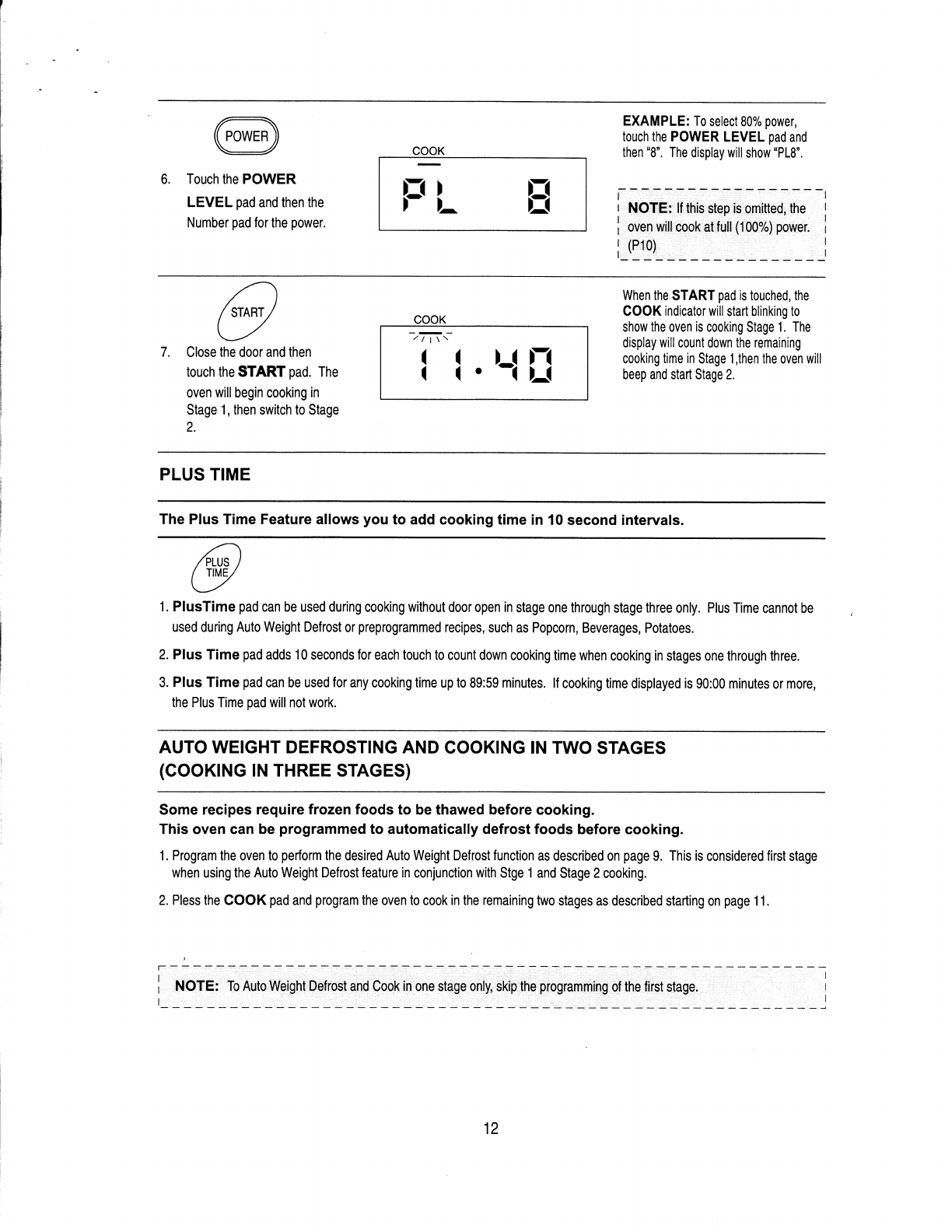
EXAMPLE: To select 80% power,
touch the POWER LEVEL pad and
then "8". The display will show'PL8'.
I
6. Touch the POWER
LEVEL pad and then the
Number pad for the power.
t ,NOT.E::. lf:.this Step,,isl,0mitted, the
i ouen will cook at full (100%) power.
I (P1o)
cooK
FL H
When the START pad is touched, the
COOK indicator will start blinking to
show the oven is cooking Stage 1. The
display will count down the remaining
cooking time in Stage 1,then the oven will
beep and start Stage 2.
7. Close the door and then
touch the START pad. The
oven will begin cooking in
Stage 1 , then switch to Stage
2.
cooK
7fr.-
i i.{il
PLUS TIME
The Plus Time Feature allows you to add cooking time in 10 second intervals.
1. PlusTime pad can be used during cooking without door open in stage one through stage three only, Plus Time cannot be
used during Auto Weight Defrost or preprogrammed recipes, such as Popcorn, Beverages, Potatoes.
2. Plus Time pad adds 10 seconds for each louch to counl down cooking time when cooking in stages one through three.
3. Plus Time pad can be used for any cooking time up to 89:59 minutes. ll cooking time displayed is 90:00 minutes or more,
the Plus Time pad will not work.
AUTO WEIGHT DEFROSTING AND COOKING IN TWO STAGES
(cooKrNG rN THREE STAGES)
Some recipes require trozen foods to be thawed before cooking.
This oven can be programmed to automatically defrost foods before cooking.
1. Program the oven to perform the desired Auto Weight Defrost function as described on page 9. This is considered first stage
when using the Auto Weight Defrost feature in conjunction with Stge 1 and Stage 2 cooking.
2. Pless the COOK pad and program the oven to cook in the remaining two stages as described starting on page 11.
I UOfe, To Auto Weight Oetrost anO Cook in one stage only, skip the programming of the lirst stage. i
l
t____
12
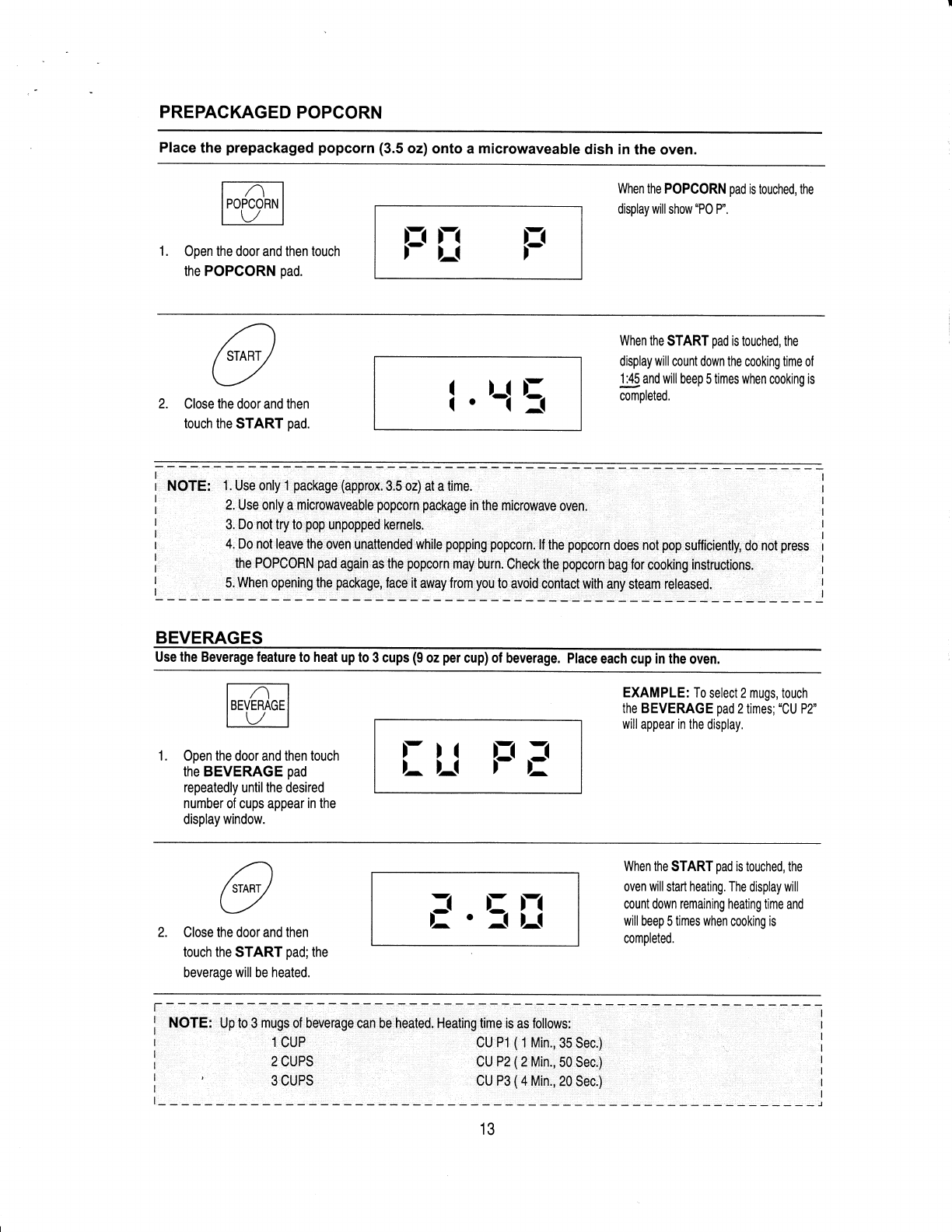
PREPACKAGED POPCORN
Place the prepackaged popcorn (3.5 oz) onto a microwaveable dish in the oven.
When the POPCORN pad is touched, the
display will show uPO P".
1. Open the door and then touch
the POPCORN pad. F[ F
When the START pad is touched, the
display will count down the cooking time of
Wand will beep 5 times when cooking is
completed.
2. Close the door and then
touch the START pad. I o'-l I
NOTE: 1. Use only 1 package (approx. 3.5 oz) at a time.
2. Use only a microwaveable popcorn package in the microwave oven.
3:,Donottrylep00:,unpop.ped.keinelg. I . ,,j,.,,' .'', I
4;,Eo not reavtirg$ n,Unaitenoeo while poqping popcorni 1t the popqrp oles iiit op ffiienififfiat1rese I
the POPCORN pad again as the popcorn rnay burn. Check the popcorn'bag for cooking instructions. i
5. When opening the package, face it away lrom you to avoid dontact with any steam released. i
BEVERAGES
Use the Beverage feature to heat up to 3 cups (9 oz per cup) of beverage, Place each cup in the oven.
EXAMPLE: To select 2 mugs, touch
the BEVERAGE pad 2 times; "CU P2'
will appear in the display.
1 . Open the door and then touch
the BEVERAGE pad
repeatedly until the desired
number of cups appear in the
display window.
ILi FI
TOTil
When the START pad is touched, the
oven will start heating. The display will
count down remaining heating time and
will beep 5 times when cooking is
completed.
2. Close the door and then
touch the START pad; the
beverage will be heated.
____:_, __
NOTE: Up to 3 mugs of beverage can be heated. Heating time is as follows:
CU,P,1, ( l Min;, S5 Sec.,)
CU P2 ( 2 Min., 50 Sec.)
CU P3 ( 4 Min., 20 Sec.)
1.,,cUP
2. CUPS
gi.CUPS
13
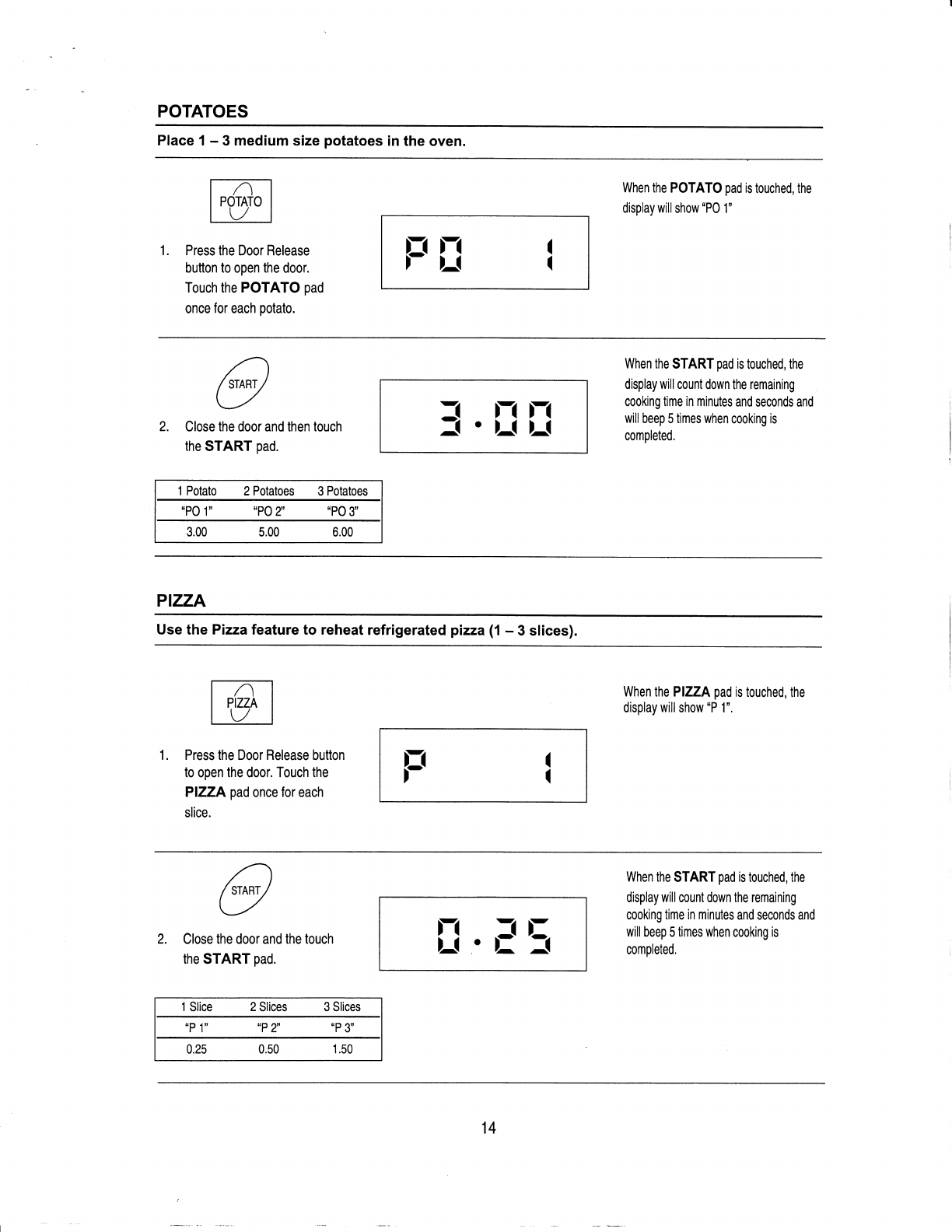
POTATOES
Place 1 - 3 medium size potatoes in the oven.
When the POTATO pad is touched, the
display will show uPO 1"
1 . Press the Door Release
button to open the door.
Touch the POTATO pad
once for each potato.
FX (
(
2. 10[[
When the START pad is touched, the
display will count down the remaining
cooking time in minutes and seconds and
will beep 5 times when cooking is
completed.
Close the door and then touch
the START pad.
1 Potato 2 Potatoes 3 Potatoes
"PO 1" t'PO 2" UPO 3"
3.00 5.00 6.00
PIZZA
Use the Pizza feature to reheat refrigerated pizza (1 - 3 slices).
When lhe PIZZA pad is touched, the
display will show uP 1'.
1 . Press the Door Release button
to open the door. Touch the
PIZZA pad once for each
slice.
F(
(
2. Close the door and the touch
the START pad. il TT
When the START pad is touched, the
display will count down the remaining
cooking time in minutes and seconds and
will beep 5 times when cooking is
completed.
1 Slice 2 Slices 3 Slices
uP 1', uP 2', uP 3"
0.25 0.50 1.50
14
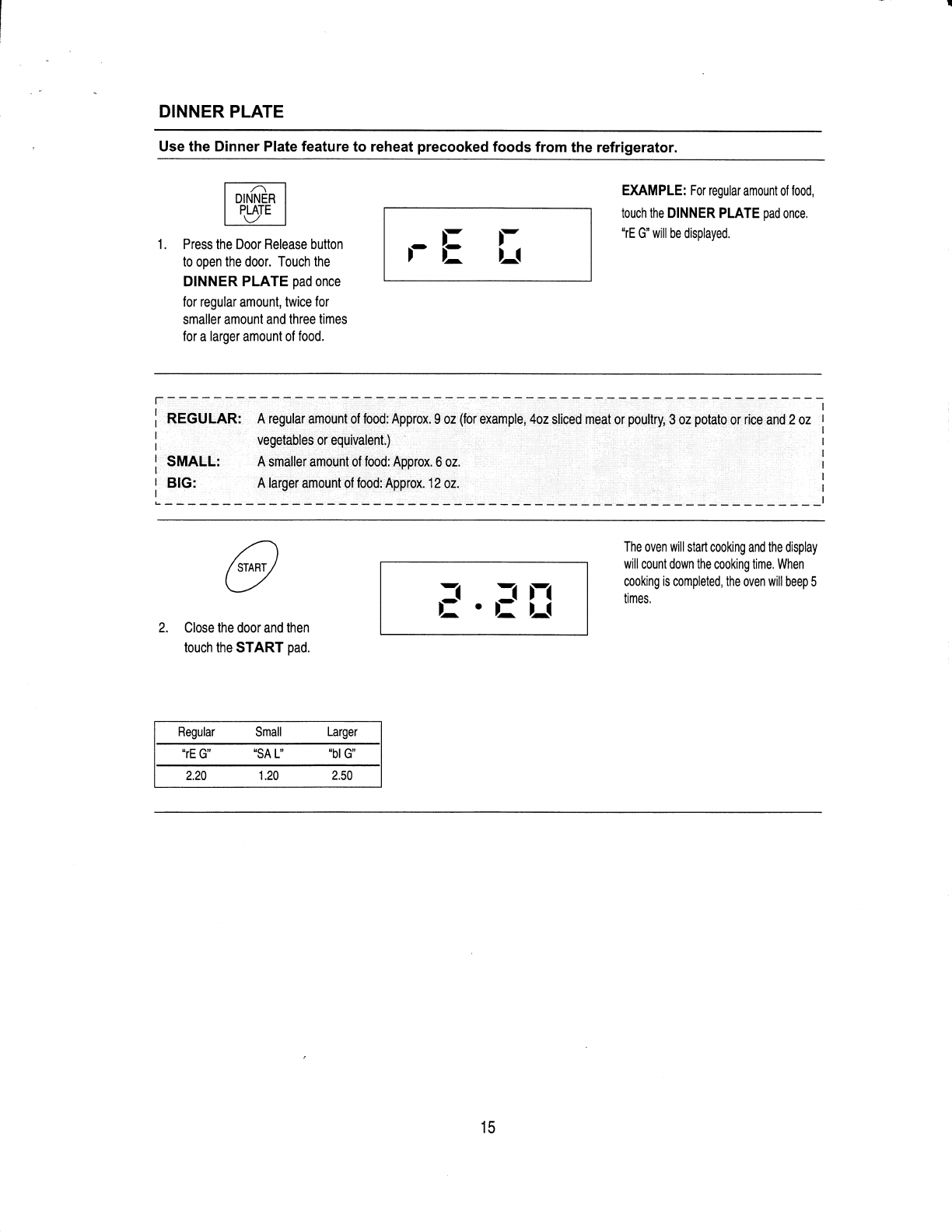
DINNER PLATE
Use the Dinner Plate feature to reheat precooked foods from the refrigerator.
EXAMPLE: For regular amount ol food,
touch the DINNER PLATE pad once.
"rE G" will be displayed.
1 . Press the Door Release button
to open the door. Touch the
DINNER PLATE pad once
for regular amount, twice for
smaller amount and three times
for a larger amount of food.
)-t I
r---..:-=-].T-.T:--TT-:-.-:--..l:-TT---:--
REGId+AR:,. A regular amottnfOf hod: Apptox,g',si:(fiir exarnplb, 4oz,sliced meg.br poulffi:S 0z potab 0r rics,and 2 oz
, :t vegetables 0r equitabnt]):
SMALL: A smaller amount of food: Approx. 6 oz.
BIG: i' A larger arnou,ht::of::f00dl:rApprox. 12 oz.
t.FI The oven will start cooking and the display
will count down the cooking time. When
cooking is completed, the oven will beep 5
times.
2. Close the door and then
touch the START pad.
Regular Small Larger
"rE G" USA L" ubl G"
2.20 1.20 2.50
15

HOLD WARM
The Hold Warm feature can be used to keep food warm after microwave or conventional cooking
is completed.
1. Program the desired power
level and cooking time as
previously instructed.
EXAMPLE: Select a cooking time ol
"25:10".
cooK
-/
rU
--,1 )-,
,^^lo ().1
(X
EXAMPLE: To select 20 minutes,
touch the HOLD WARM padz
times.
2. Touch the HOLD WARM
pad for every 10 minutes of
Hold Warm time desired (up
to 30 minutes).
COOK
TIOilX
3. Close the door and then touch
the START pad; the oven will
begin cooking as programmed
in step 1 .
When the cooking is completed,
the oven will begin the Hold Warm
mode as programmed in step 2.
EXAMPLE: To HOLD WARM indicator
will light, the oven will begin cooking and
the display will count down the remaining
cooking time.
When cooking is completed, the HOLD
WARM indicator will start blinking. The
display will count down the remaining Hold
Warm time. When the Hold Warm time
ends, you will hear 5 beeps.
tx.[il
cooK
z/ l\\
TTO iI
T---
r NOTES:
I.
i 'The Hold Warm feature operates ind6pendently or togetheiwith Stage 1 cooking
I . to keep food warm after conventional cooking, omit step 1.
t__
16
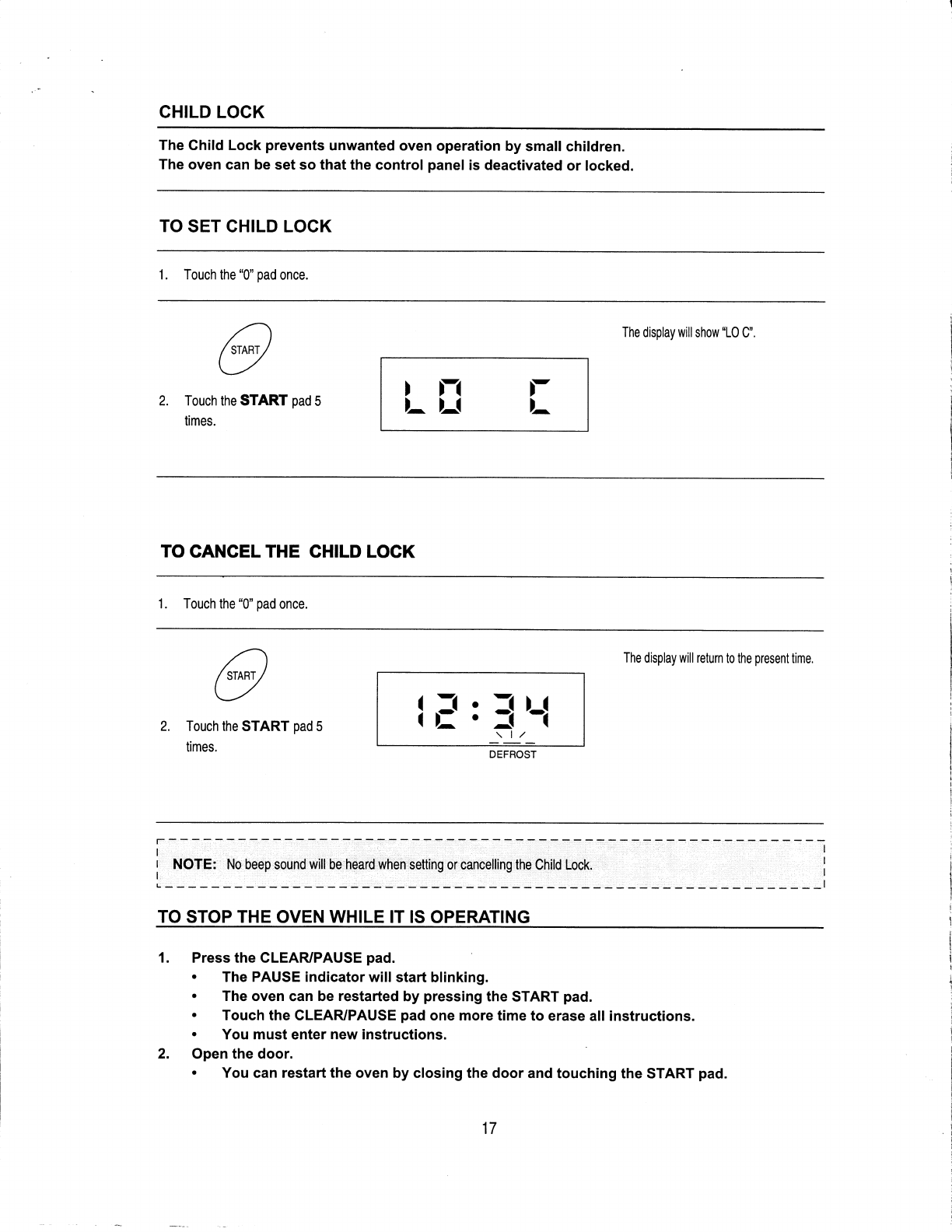
CHILD LOCK
The Ghild Lock prevents unwanted oven operation by small children.
The oven can be set so that the control panel is deactivated or locked.
TO SET CHILD LOCK
1 . Touch the "0" pad once.
n
l/
2. Touch the START pad 5
times.
The display will show -10 C'.
))-1
LX r
L
TO GANGEL THE CHILD LOGK
1 . Touch the "0" pad once.
The display will return to the present time.
2. Touch the START pad 5
times.
1. Press the CLEAR/PAUSE pad.
. The PAUSE indicator will start blinking.
. The oven can be restarted by pressing the START pad.
. Touch the GLEAR/PAUSE pad one more time to erase all instructions.
. You must enter new instructions.
2. Open the door.
. You can restart the oven by closing the door and touching the START pad.
1----
tl
i lOte: No beep sound will be"heard when setting or cancelling the Child Lock. i
I
L - - - - - - - - -l
TO STOP THE OVEN WHILE IT IS OPERATING
lI : :.{
DEFROST
17

COOKING GUIDE
THE PRINCIPLES OF MICROWAVE COOKING
Microwaves are a form of high frequency radio waves similar to those used by a radio including
AM, FM and CB. Electricity is converted into microwave energy by the magnetron tube. From the
magnetron tube, microwave energy is transmitted to the oven where it is reflected, transmitted,
and absorbed by the food.
Reflection
Microwaves are reflected by metal just as a ball is bounced off a wall, For this reason, metal utensils are not suitable for use
in the microwave. A combination ol stationary interior walls and a rotaling metal turntable or stirrer fan helps assure that the
microwaves are well distributed within the oven cavity to produce even cooking.
Transmission
Microwaves pass through some materials such as paper, glass and plastic much like sunlight shining through a window.
Because these substances do not absorb or rellect the microwave energy, they are ideal materials for microwave oven
cooking containers.
Absorption
During cooking, microwaves will be absorbed by food. They penetrate to a depth ol about 3l4lo 1 112 inches. Microwave
energy activates the molecules in the food (especially water, fat and sugar), and heat is produced. ll you vigorously rub your
hands together, you will feel heat produced by friction. The internal cooking of larger foods is done by conduction as the heat
which is produced by lriction is conducted to the middle of the food. Foods also continue to cook by conduction during
standing time.
THE EMERSON OMNI WAVE COOKING SYSTEM'N
This new, specially designed 'Omni Wave Cooking Syslem'r " ulilizes a series of performance-engineered pyramids in the
oven's interior cavity. They distribute microwave energy in a much more effective omni-directional pattern to the food.
This action promotes faster, more uniform cooking, with fewer hot ol cold spots. Together with the integal rotating glass tray,
this new ' Omni Wave Cooking Systemil " is very eflicient and fasl.
Omni Wave Badiates microwave energy al convex diverters that miximize the microwave absorbed by the lood mass, which
result in even cooking. No more hot or cold spots!
frruru
ffffiffrr
r#-rfi-fFl
OOO
lolotd
lololo
tororo
@
18
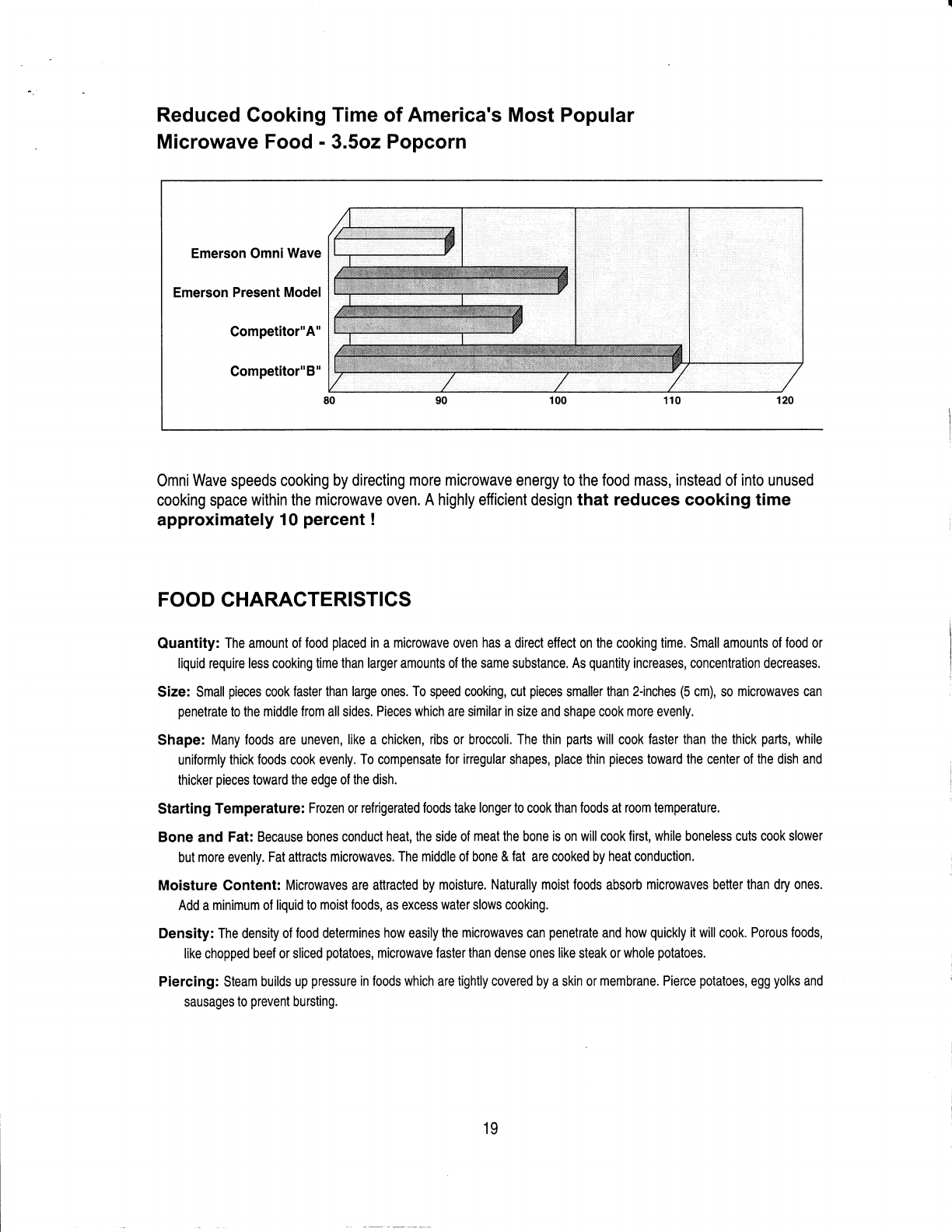
Reduced Gooking
Microwave Food r
Time of America's Most Popular
3.5o2 Popcorn
Emerson Omni Wave
Emerson Present Model
Competitor"A"
Competitor"B"
OmniWave speeds cooking by directing more microwave energy to the food mass, instead of into unused
cooking space within the microwave oven. A highly efficient design that reduces cooking time
approximately 10 percent !
FOOD CHARAGTERISTICS
Quantity: The amount ol lood placed in a microwave oven has a direct etfect on the cooking time. Small amounts ol lood or
liquid require less cooking time than larger amounts ol the same substance. As quantity increases, concentration decreases,
Size: Small pieces cook fasler than larye ones. To speed cooking, cut pieces smaller than 2-inches (5 cm), so microwaves can
penetrate to the middle from all sides. Pieces which are similar in size and shape cook more evenly.
Shape: Many foods are uneven, like a chicken, ribs or broccoli. The thin parts will cook laster than the thick parts, while
unilormly thick foods cook evenly. To compensate lor inegular shapes, place thin pieces toward the center of the dish and
thicker pieces toward the edge ol the dish.
Starting Temperature: Frozen or relrigerated loods take longer to cook than loods at room temperature.
Bone and Fat: Because bones conduct heat, the side of meat the bone is on will cook first, while boneless cuts cook slower
but more evenly. Fat attracts microwaves. The middle ol bone & lat are cooked by heat conduction.
Moisture Gontent: Microwaves are attracted by moisture. Naturally moist foods absorb microwaves better than dry ones.
Add a minimum of liquid to moist foods, as excess water slows cooking,
Density: The density of lood determines how easily the microwaves can penetrate and how quickly it will cook. Porous foods,
like chopped beef or sliced potaloes, microwave laster than dense ones like steak or whole potatoes.
Piercing: Steam builds up pressure in foods which are tightly covered by a skin or membrane. Pierce potatoes, egg yolks and
sausages to prevent bursting.
19
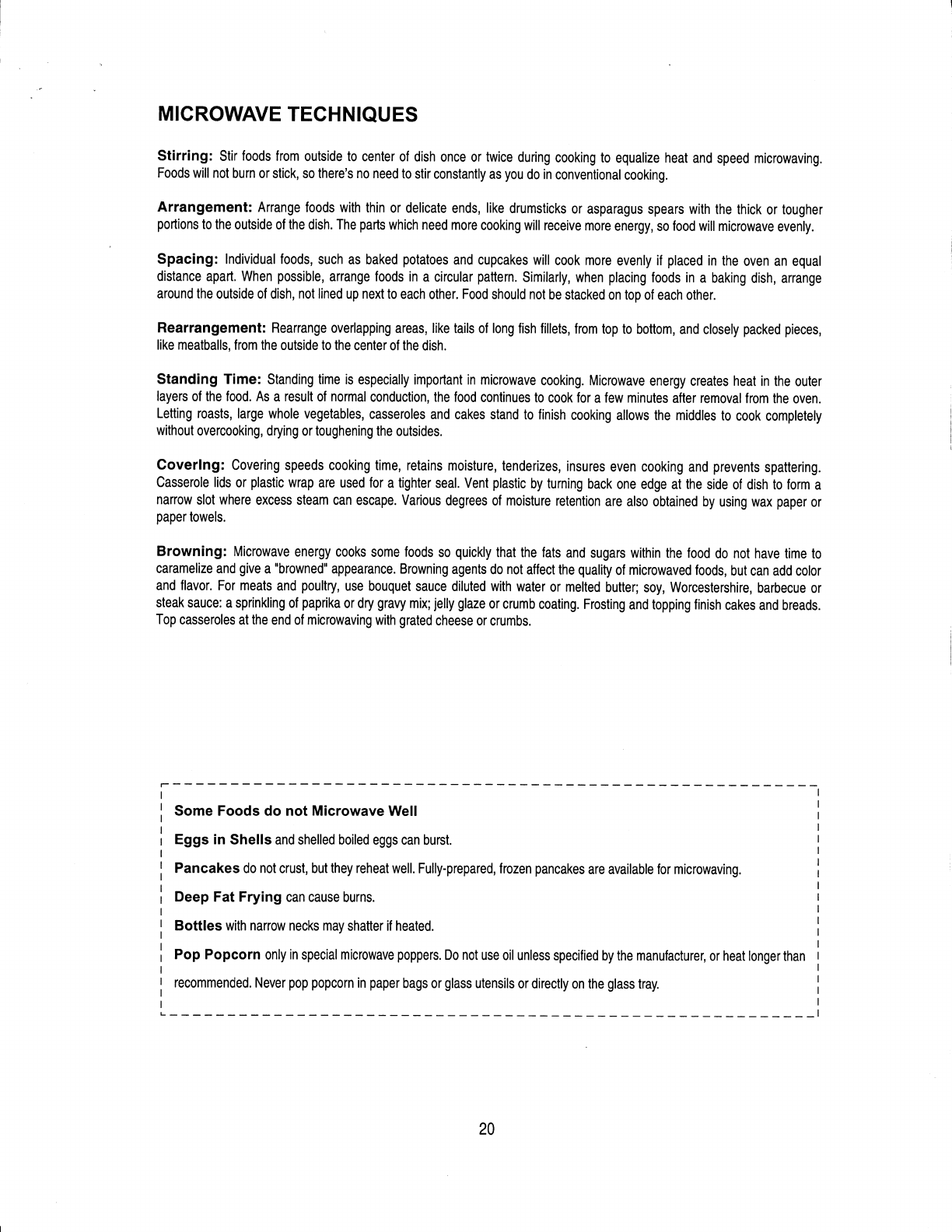
MIGROWAVE TEGHNIQUES
Stirring: Stir foods from outside to center of dish once or twice during cooking to equalize heat and speed microwaving.
Foods will not burn or stick, so there's no need to stir constantly as you do in conventional cooking.
Arrangement: Arrange foods with thin or delicale ends, like drumsticks or asparagus spears with the thick or tougher
pofiions to the outside ol the dish. The parts which need more cooking will receive more energy, so food will microwave evenly.
Spacing: lndividual foods, such as baked potatoes and cupcakes will cook more evenly if placed in the oven an equal
distance apart, When possible, arrange foods in a circular pattern. Similarly, when placing loods in a baking dish, arrange
around the outside of dish, not lined up next to each other, Food should not be stacked on top ol each other.
Rearrangement: Rearrange overlapping areas, like tails ol long fish fillets, lrom top to bottom, and closely packed pieces,
like meatballs, from the outside to the center of the dish.
Standing Time: Standing time is especially important in microwave cooking. Microwave energy creates heat in the ouler
layers of the food. As a result of normal conduction, the lood continues to cook lor a few minutes alter removal from the oven.
Letting roasts, large whole vegetables, casseroles and cakes stand to linish cooking allows the middles to cook completely
without overcooking, drying or toughening the outsides.
Coverlng: Covering speeds cooking time, retains moisture, tenderizes, insures even cooking and prevents spattering.
Casserole lids or plastic wrap are used for a tighter seal. Vent plastic by turning back one edge at the side of dish to form a
nanow slot where excess steam can escape. Various degrees of moisture retention are also obtained by using wax paper or
paper towels.
Browning: Microwave energy cooks some foods so quickly that the fats and sugars within the food do not have time to
caramelize and give a "browned" appearance. Browning agents do not allect the quality of microwaved foods, but can add color
and flavor. For meats and poullry, use bouquet sauce diluted with water or melted buller; soy, Worcestershire, barbecue or
steak sauce: a sprinkling ol paprika or dry gravy mix;jelly glaze or crumb coating. Frosting and topping finish cakes and breads.
Top casseroles at the end of microwaving with grated cheese or crumbs.
Some Foods do not Microwave Well
Eggs in Shells and shelled boiled eggs can burst.
Pancakes do not crust, but they reheat well. Fully-prepared, frozen pancakes are available for microwaving.
Deep Fat Frying can cause burns.
Bottles with nanow necks may shatter il heated.
Pop Popcorn only in special microwave poppers. Do not use oil unless specilied by the manufacturer, or heat longer than
recommended. Never pop popcorn in paper bags or glass utensils or directly on the glass tray.
20
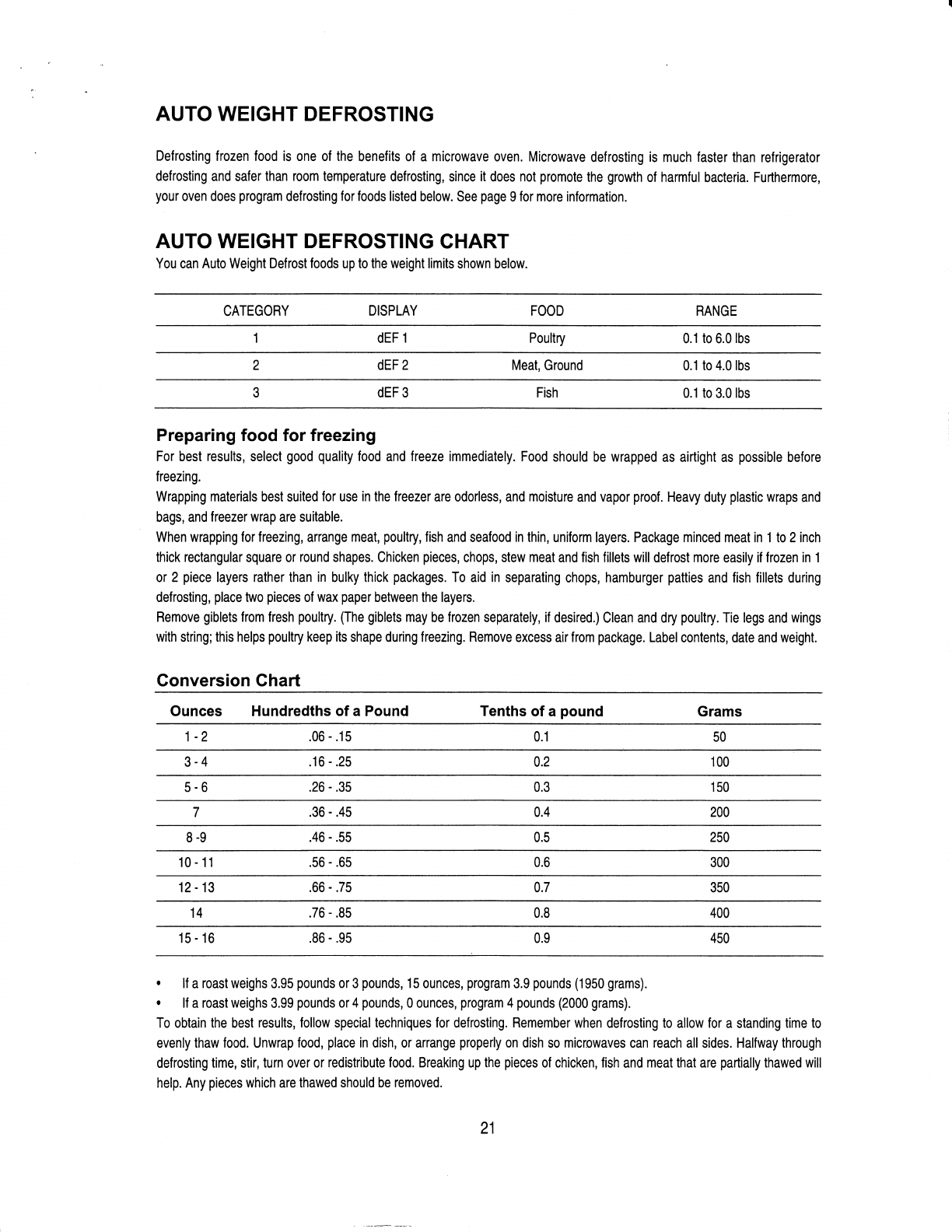
AUTO WEIGHT DEFROSTING
Defrosting frozen food is one of the benefits of a microwave oven. Microwave defrosting is much laster than relrigerator
defrosting and safer than room temperature defrosling, since it does not promote the growth ol harmful bacteria. Furthermore,
your oven does program defrosting for foods listed below. See page 9 for more information.
AUTO WEIGHT DEFROSTING CHART
You can Auto Weight Delrost loods up to the weighl limits shown below.
CATEGORY DISPLAY FOOD RANGE
dEF 1Poultry 0.1 to 6.0 lbs
dEF 2Meat, Ground 0.1 to 4.0 lbs
0.1 to 3.0 lbs
Preparing food for freezing
For best results, select good quality food and lreeze immediately. Food should be wrapped as airtight as possible before
lreezing.
Wrapping malerials best suited for use in the lreezer are odorless, and moisture and vapor proof. Heavy duty plastic wraps and
bags, and freezer wrap are suitable,
When wrapping lor freezing, arrange meat, poultry, lish and seafood in thin, uniform layers. Package minced meat in 1 to 2 inch
thick rectangular square or round shapes. Chicken pieces, chops, stew meat and fish lillets will defrost more easily if frozen in 1
or 2 piece layers rather than in bulky thick packages. To aid in separating chops, hamburger patties and lish fillets during
defrosting, place two pieces ol wax paper between lhe layers.
Remove giblets lrom fresh poultry. fhe giblets may be frozen separately, if desired.) Clean and dry poultry. Tie legs and wings
with string; this helps poultry keep its shape during freezing. Remove excess air lrom package. Label contents, date and weight.
Conversion Chart
Ounces Hundredths of a Pound Tenths of a pound Grams
dEF 3Fish
0.1
1-2 .06 - .15
3 - 4 .16 - .25 1000.2
s-6 .26-.35 1500.3
.36 - .45 0.4
8-9 .46 - .55 2500.5
10 - 11 .56 -.65 0.6
12 - 13 .66 - .75 4.7
0.8
14 .76 - .85
450
. ll a roast weighs 3.95 pounds or 3 pounds, 15 ounces, program 3.9 pounds (1950 grams).
. ll a roast weighs 3.99 pounds or 4 pounds, 0 ounces, program 4 pounds (2000 grams).
To obtain the best results, lollow special techniques lor defrosting. Remember when defrosting to allow for a standing time to
evenly thaw food. Unwrap food, place in dish, or arrange properly on dish so microwaves can reach all sides. Hallway through
defrosting lime, stir, turn over or redistribute food. Breaking up the pieces ol chicken, lish and meat that are partially thawed will
help. Any pieces which are thawed should be removed.
15 - 16 .86 - .95 0.9
21
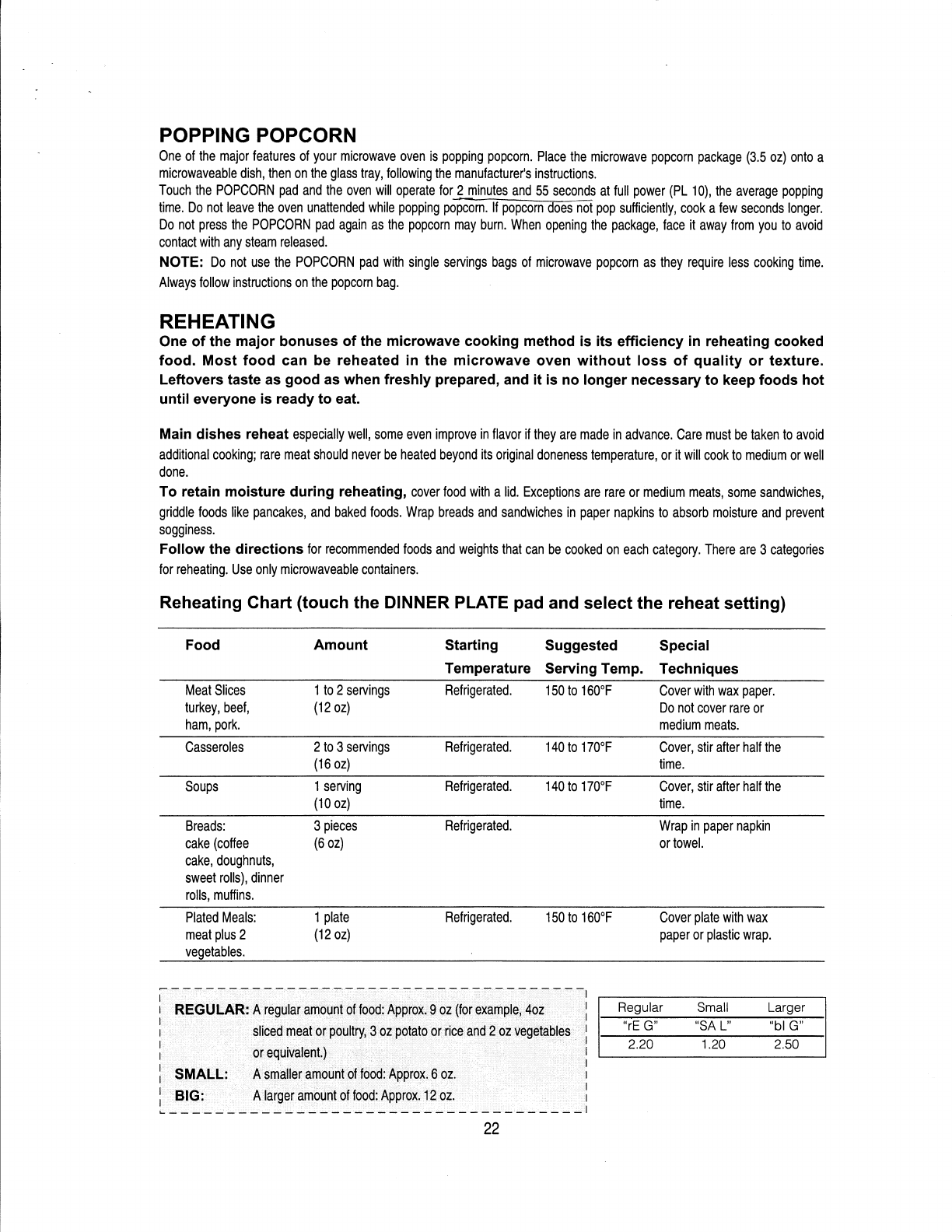
POPPING POPCORN
One of the major features of your microwave oven is popping popcom. Place the microwave popcorn package (3.5 oz) onto a
microwaveable dish, then on the glass tray, lollowing the manulacture/s instructions.
Touch the POPCORN pad and the oven will operate for 2 minutes and 55 seconds at full power (PL 10), the average popping
time, Do not leave the oven unattended while popping po-iffi.li-popco-rn AOA;oi pop sufficiently, cook a lew seconds longer.
Do not press the POPCORN pad again as the popcorn may bum. When opening the package, lace it away from you to avoid
contact with any steam released.
NOTE: Do nol use the POPCORN pad with single servings bags of microwave popcorn as they require less cooking time.
Always follow instructions on the popcorn bag.
REHEATING
One of the major bonuses of the microwave cooking method is its efficiency in reheating cooked
food. Most food can be reheated in the microwave oven without loss of quality or texture.
Leftovers taste as good as when freshly prepared, and it is no longer necessary to keep foods hot
until everyone is ready to eat.
Main dishes reheat especially well, some even improve in llavor if they are made in advance, Care musl be taken to avoid
additional cooking; rare meat should never be heated beyond its original doneness temperature, or it will cook to medium or well
done.
To retain moisture during reheating, cover food with a lid. Exceptions are rare or medium meals, some sandwiches,
griddle loods like pancakes, and baked foods. Wrap breads and sandwiches in paper napkins lo absorb moisture and prevent
sogginess.
Follow the directions lor recommended foods and weights lhat can be cooked on each category. There are 3 categories
for reheating, Use only microwaveable containers.
Reheating Ghart (touch the DINNER PLATE pad and select the reheat setting)
Food Amount Starting Suggested Special
Temperature ServingTemp. Techniques
Meat Slices 1 to 2 seruings Refrigerated. 1 50 to 160"F Cover with wax paper.
lurkey, beef, (12o2) Do nol cover rare or
ham, pork. medium meats.
Casseroles 2 to 3 servings Refrigerated. 140 to 170"F Cover, stir alter hall the
(16 oz) lime.
Soups 1 serving Refrigerated. 140 to 170"F Cover, stir alter half the
(10 oz) time.
Breads: 3 pieces Refrigerated. Wrap in paper napkin
cake (coffee (6 oz) or towel.
cake, doughnuts,
sweet rolls), dinner
rolls, mufiins.
Plated Meals: 1 plate
meat plus 2 (12 oz)
vegetables.
Refrigerated. 150 to 160"F Cover plate with wax
paper or plastic wrap.
REG U LAR:
l;l11l llffiilrlilffitlllffi :i:#ff##i ;;
or equivalent.)
Regular Small Larger
"rE G" "SA L" "bl G"
2.20 1.20 2.50
I SUALL: A smalter amount of food: Approx.6 oz.
I elC: A larger amount of food: Approx. 12 oz.
22
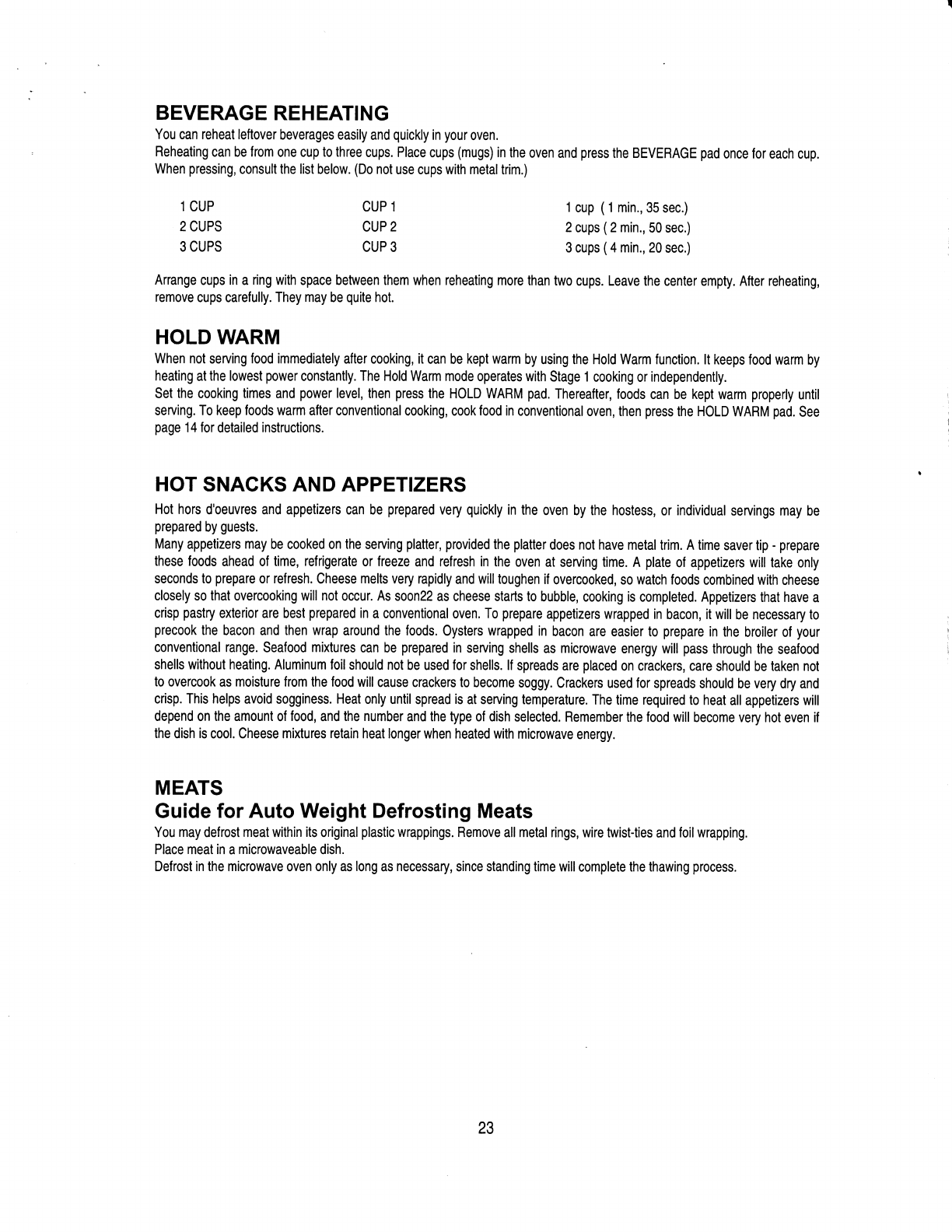
BEVERAGE REHEATING
You can reheat leftover beverages easily and quickly in your oven,
Reheating can be from one cup to three cups. Place cups (mugs) in the oven and press the BEVERAGE pad once lor each cup.
When pressing, consult the list below. (Do not use cups with metaltrim.)
1 CUP
2 CUPS
3 CUPS
CUP 1
CUP 2
CUP 3
1 cup ( 1 min., 35 sec.)
2 cups ( 2 min., 50 sec.)
3 cups ( 4 min., 20 sec.)
Arrange cups in a ring with space between them when reheating more than two cups. Leave the center empty. After reheating,
remove cups carefully. They may be quite hot.
HOLD WARM
When not serving food immediately after cooking, it can be kept warm by using the Hold Warm function. lt keeps food warm by
heating at the lowest power constantly. The Hold Warm mode operates with Stage 1 cooking or independently.
Set the cooking times and power level, then press the HOLD WARM pad. Thereafter, loods can be kept warm properly until
serving. To keep foods warm after conventional cooking, cook food in conventional oven, then press the HOLD WARM pad. See
page 14 lordetailed instructions.
HOT SNACKS AND APPETIZERS
Hot hors d'oeuvres and appetizers can be prepared very quickly in the oven by the hostess, or individual servings may be
prepared by guests.
Many appetizers may be cooked on the serving platter, provided the platter does not have metal trim, A time saver tip - prepare
these loods ahead ol time, refrigerate or freeze and refresh in the oven at serving time, A plate ol appetizers will take only
seconds to prepare or refresh. Cheese melts very rapidly and will toughen il overcooked, so watch foods combined with cheese
closely so lhat overcooking will not octur. As soon22 as cheese starts to bubble, cooking is completed. Appetizers that have a
crisp paslry exlerior are best prepared in a conventional oven. To prepare appetizers wrapped in bacon, it will be necessary to
precook the bacon and then wrap around the foods. Oysters wrapped in bacon are easier to prepare in the broiler ol your
conventional range, Seafood mixtures can be prepared in serving shells as microwave energy will pass through the seafood
shells without healing. Aluminum loil should not be used for shells. lf spreads are placed on crackers, care should be taken not
to overcook as moisture lrom the food will cause crackers to become soggy. Crackers used lor spreads should be very dry and
crisp. This helps avoid sogginess. Heat only until spread is at serving temperalure. The time required to heat all appetizers will
depend on the amount of food, and lhe number and the type ol dish selected. Remember the food will become very hot even if
the dish is cool. Cheese mixtures retain heat longer when heated with microwave energy.
MEATS
Guide for Auto Weight Defrosting Meats
You may defrost meat within its original plastic wrappings. Remove all metal rings, wire twist-ties and foilwrapping.
Place meat in a microwaveable dish.
Delrost in the microwave oven only as long as necessary, since standing time will complete the thawing process.
23
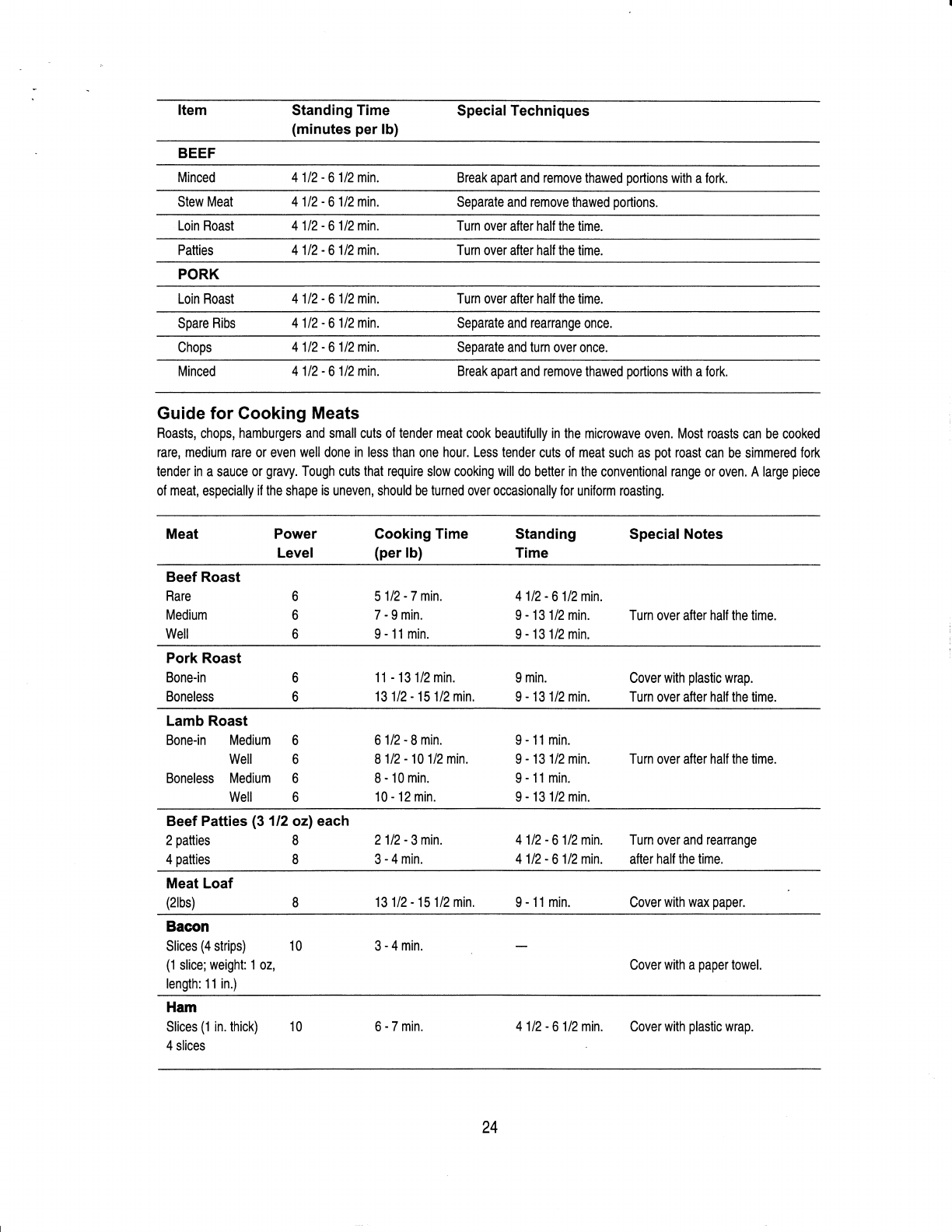
Item Standing Time Special Techniques
(minutes per lb)
BEEF
Minced 4112 - 61l2min. Break apart and remove thawed portions with a fork.
Stew Meat 4112 - 6 1 l2min. Separate and remove thawed portions.
Loin Roast 4112 - 6 1 l?ntn. Turn over after half the time.
Patties 4 112 - 6 1 12 nin. Turn over after half the time.
PORK
Loin Roast 4112 - 6 1 l?min. Turn over after half the time.
Spare Ribs 4112 - 6 1 l2min. Separate and rearrange once.
Chops 4 112 - 6 1 12 nin. Separate and turn over once.
Minced 4 112 - 6 112 min. Break aparl and remove thawed portions with a fork.
Guide for Cooking Meats
Roasts, chops, hamburgers and small cuts of tender meat cook beautifully in the microwave oven. Most roasts can be cooked
rare, medium rare or even well done in less than one hour. Less tender cuts of meat such as pot roast can be simmered lork
lender in a sauce or gravy. Tough cuts that require dow cooking will do better in the conventional range or oven. A large piece
of meal, especially if the shape is uneven, should be turned over occasionally for uniform roasting.
Meat Power Gooking Time Standing Special Notes
Level (per lb) Time
Beef Roast
Rare 6 5112-7 nin. 4112-61l2min.
Medium 6 7 - 9 min. 9 - 13 1/2 min. Turn over after half the time.
Well 6 9-11min. 9-131/2min.
Pork Roast
Bone-in 6 11 - 13 1/2 min, 9 min. Cover with plastic wrap.
Boneless 6 13112-15112min. 9-131/2min. Turnoverafterhallthetime.
Lamb Roast
Bone-in Medium 6 61/2-8min. 9-11min.
Well 6 8 112 - 101l2nin. 9 - 13 1/2 min. Turn over alter half the time.
Boneless Medium 6 8-10min, 9-11min.
Well 6 10 - 12 min. 9 - 13 1/2 min.
Beef Patties (3 1/2 oz) each
2 patlies I 2112 - 3 min. 4 112 - 6 112 min. Turn over and rearrange
4patties 8 3-4min. 4112-61l2min. afterhalfthetime.
Meat Loaf
(2lbs) 8 13112-15112min. 9-11min. Coverwithwaxpaper.
Bacon
Slices (4 strips) 10 3 - 4 min.
(1 slice; weight: 1 oz,
length: 1 1 in.)
Cover with a paper towel.
Ham
Slices (1 in. thick) 10 6 -7 min.
4 slices
24
4 112 - 6 1 12 min. Cover with plastic wrap.
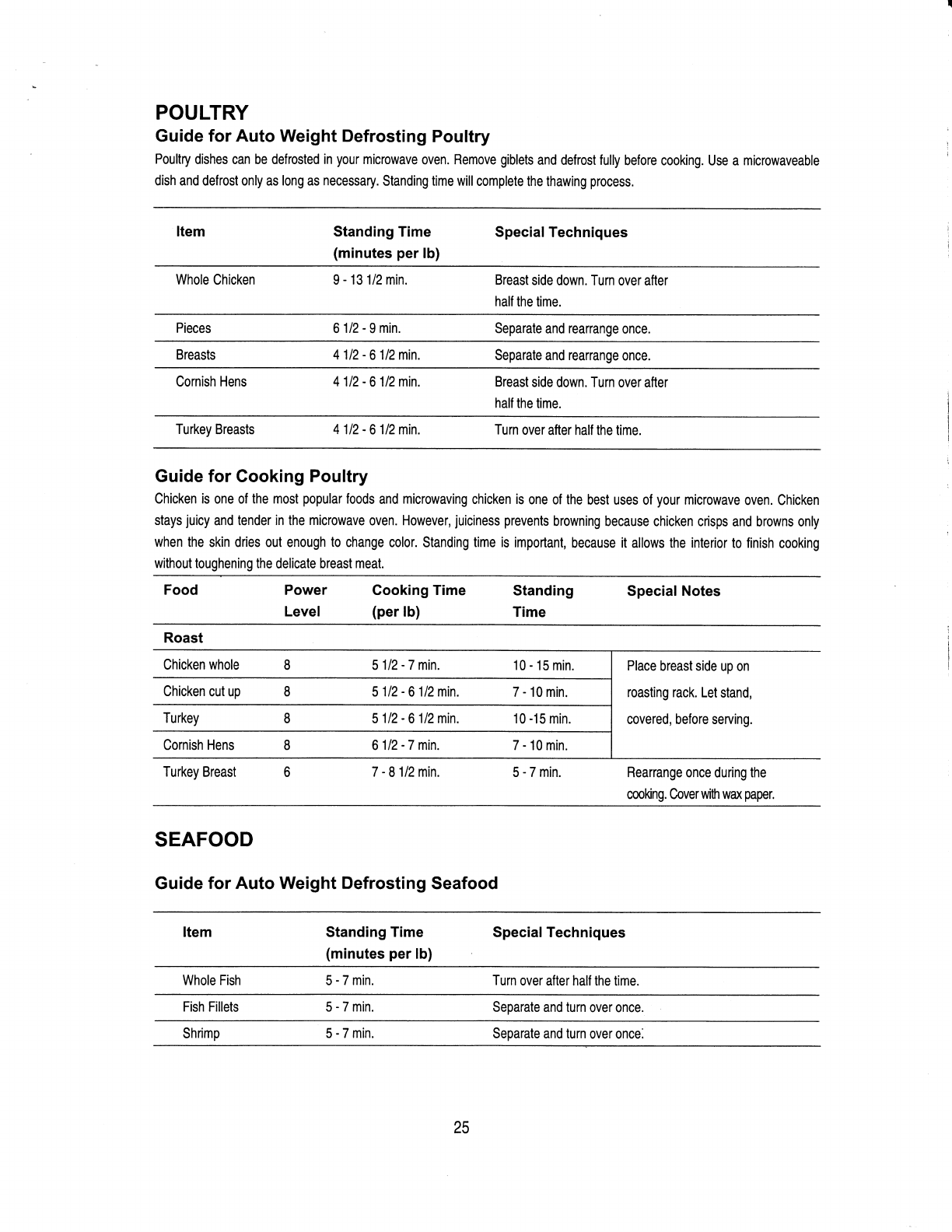
POULTRY
Guide for Auto Weight Defrosting Poultry
Poultry dishes can be defrosted in your microwave oven. Remove giblets and delrost fully before cooking. Use a microwaveable
dish and defrosl only as long as necessary. Standing time willcomplete the thawing process.
Item Standing Time
(minutes per lb)
Special Techniques
Whole Chicken 9 - 13112 min. Breast side down. Turn over after
half the time.
Pieces 6112 - 9 min. Separate and rearrange once.
Breasts 4112-6112min. Separate and rearrange once.
Cornish Hens 4112-6112min. Breast side down. Turn over after
half the time.
Turkey Breasts 4112-6112min. Turn over after half the time.
Guide for Cooking Poultry
Chicken is one of the most popular foods and microwaving chicken is one of the best uses of your microwave oven. Chicken
stays juicy and tender in the microwave oven. However, juiciness prevents browning because chicken crisps and browns only
when the skin dries out enough to change color. Standing time is important, because it allows the interior to linish cooking
without toughening the delicate breast meat.
Food Power
Level
Gooking Time
(per lb)
Standing
Time
Special Notes
Roast
Chicken whole
Chicken cut up
Turkey
Cornish Hens
Turkey Breast
5112 - 7 min. 10 - 15 min.
5112-6112ntn. 7 - 10 min.
5112-6112min. 10 -15 min.
6112 - 7 min. 7 - 10 min.
7 -8112nin. 5 -7 min.
Place breast side up on
roasting rack, Let stand,
covered, before serving.
Rearrange once during the
cooking. Cover with wax paper.
SEAFOOD
Guide for Auto Weight Defrosting Seafood
Item Standing Time
(minutes per lb)
Special Techniques
Whole Fish 5 -7 min. Turn over after half the time.
Fish Fillets 5 -7 min. Separate and turn over once.
Shrimp 5 -7 min.
25
Separate and turn over once.
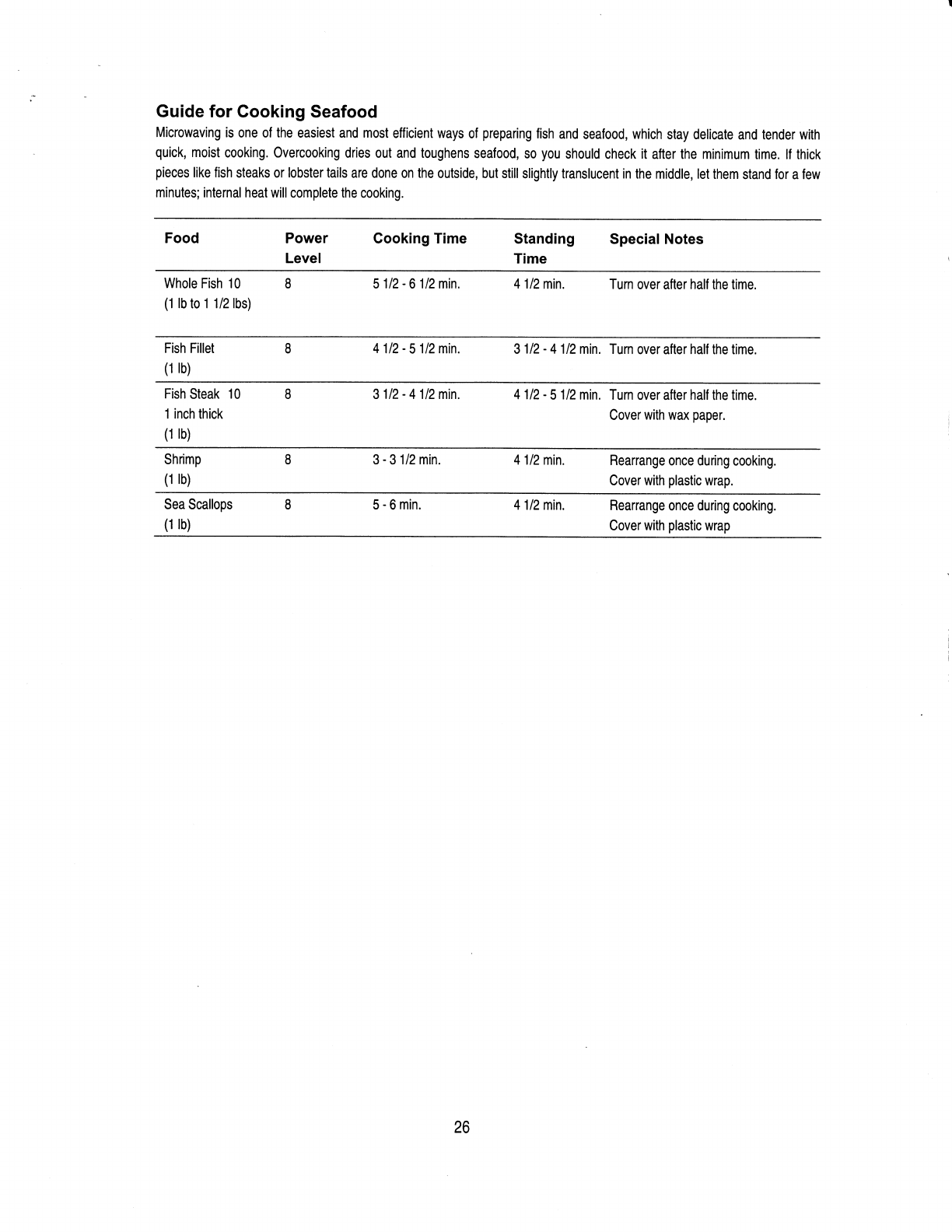
Guide for Gooking Seafood
Microwaving is one of the easiest and most eflicienl ways of preparing fish and seafood, which stay delicate and tender with
quick, moist cooking, Overcooking dries out and toughens seafood, so you should check it after the minimum time. lf thick
pieces like lish steaks or lobster tails are done on the outside, but still slightly translucent in the middle, let them stand for a few
minutes; internal heat will complete the cooking.
Food Power Gooking Time Standing Special Notes
Level Time
WholeFish 10 8 5112-61l2nin. 41l2min. Turnoverafterhalfthetime.
(1 lb to 1 1/2 lbs)
FishFillel I 4112-51l2nin. 3112-41l2min. Turnoverafterhallthetime.
(1rb)
FishSteak 10 I 3112-41l2min. 4112-51l2min. Turnoverafterhallthetime,
1 inch lhick Cover with wax paper.
(1 rb)
Shrimp
(1 rb)
8 3 - 3 112 nin. 4112 min. Rearrange once during cooking.
Cover with plastic wrap.
SeaScallops I 5-6min.
(1 tb)
4 112 min. Rearrange once during cooking.
Cover with plastic wrap
26
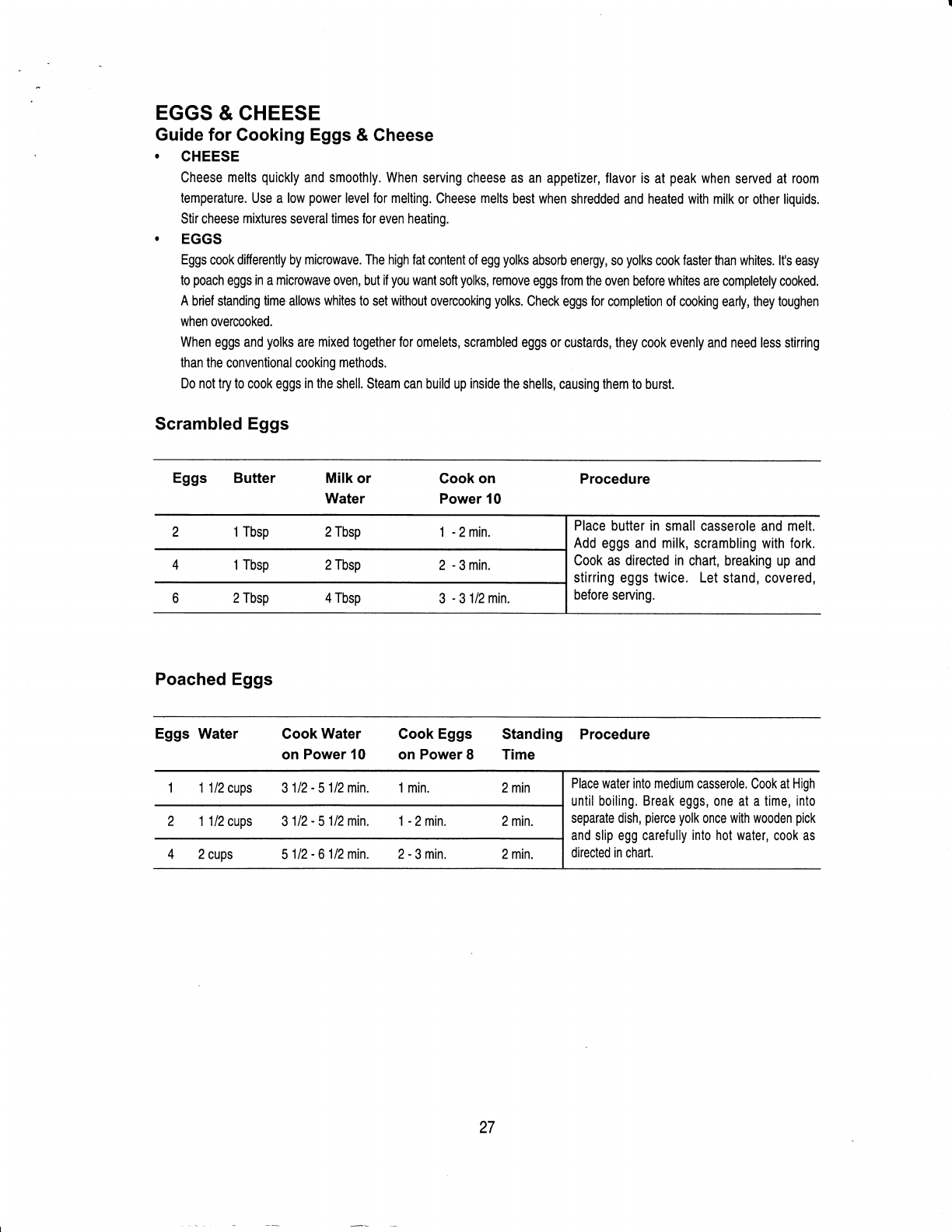
EGGS & CHEESE
Guide for Gooking Eggs & Gheese
. GHEESE
Cheese melts quickly and smoothly. When serving cheese as an appetizer, llavor is at peak when served at room
temperature. Use a low power level lor melting. Cheese melts best when shredded and heated with milk or other liquids.
Stir cheese mixtures several times for even heating.
. EGGS
Eggs cook ditlerently by microwave. The high lat content of egg yolks absorb energy, so yolks cook faster than whites. lts easy
to poach eggs in a microwave oven, but if you want soft yolks, remove eggs from lhe oven before whites are completely cooked.
A brief standing time allows whites to set without overcooking yolks. Check eggs lor completion of cooking early, they toughen
when overcooked.
When eggs and yolks are mixed together for omelets, scrambled eggs or custards, they cook evenly and need less slining
than the conventional cooking methods.
Do not try to cook eggs in the shell. Steam can build up inside the shells, causing them to burst,
Scrambled Eggs
Eggs Butter
Poached Eggs
1 Tbsp 2 Tbsp
1 Tbsp 2 Tbsp
2 Tbsp 4 Tbsp
Cook on
Power 10
1 -zmin.
2-3min.
3 - 31l2nin.
Milk or
Water
Procedure
Place butter in small casserole and melt.
Add eggs and milk, scrambling with fork.
Cook as directed in chaft, breaking up and
stirring eggs twice. Let stand, covered,
before serving.
Eggs Water Cook Water
on Power 10
Cook Eggs
on Power 8
Standing Procedure
Time
2 min
2 min.
2 min.
1 112 cups 3112-5112nin. 1 min.
1 112 cups 3112-5112nin. 1-2 min.
2 cups 5112-6112nin. 2-3min.
Place water into medium casserole. Cook at High
until boiling. Break eggs, one at a time, into
separate dish, pierce yolk once with wooden pick
and slip egg carefully into hot water, cook as
directed in chart.
27
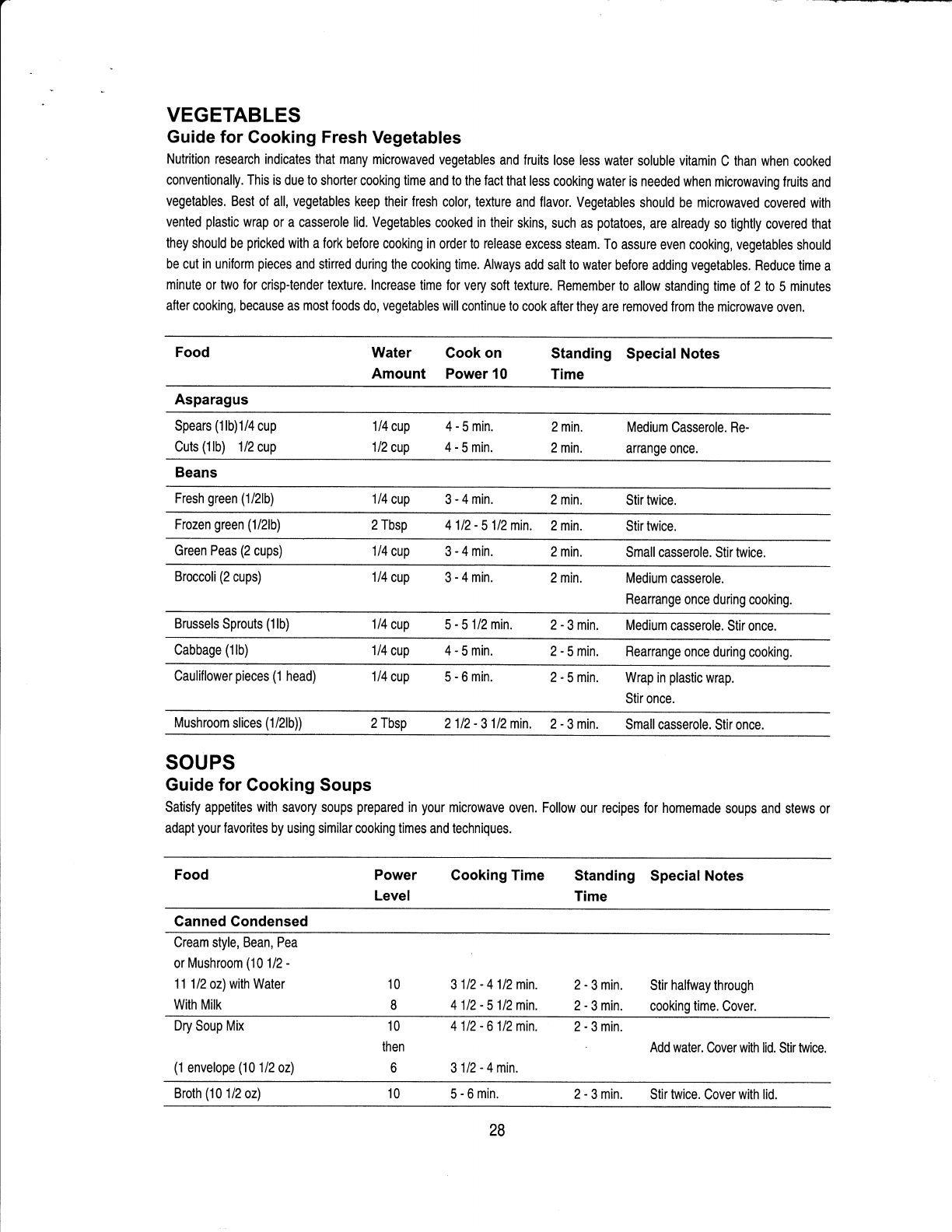
VEGETABLES
Guide for Cooking Fresh Vegetables
Nutrition research indicates that many microwaved vegetables and fruits lose less water soluble vitamin C than when cooked
convenlionally. This is due to shorter cooking time and to the lact that less cooking water is needed when microwaving fruits and
vegetables. Best ol all, vegetables keep their fresh color, texture and flavor. Vegetables should be microwaved covered with
vented plastic wrap or a casserole lid. Vegetables cooked in their skins, such as potatoes, are already so tightly covered that
they should be pricked with a fork belore cooking in order lo release excess steam. To assure even cooking, vegetables should
be cut in uniform pieces and stined during the cooking time. Always add salt to water before adding vegetables. Reduce lime a
minule or two for crisp-tender texture. lncrease time for very soft texture. Remember to allow standing time of 2 to 5 minutes
atler cooking, because as most foods do, vegetables will continue lo cook after they are removed from the microwave oven.
Food Water Gook on Standing Special Notes
Amount Power 10 Time
Asparagus
Spears (1 lb)1/4 cup
Cuts (1 lb) 112 cup
1/4 cup 4 - 5 min. 2 min. Medium Casserole. Re-
112 cup 4 - 5 min. 2 min. arrange once.
Beans
Fresh green (1/2lb) 1/4 cup 3 - 4 min. 2 min. Stir twice.
Frozen green (1l2lb) 2 Tbsp 4112 - 5 1 12min. 2 min. Stir twice.
Green Peas (2 cups) 1/4 cup 3 - 4 min. 2 min. Small casserole. Stir twice.
Broccoli (2 cups) 1/4 cup 3 - 4 min. 2 min. Medium casserole.
Reanange once during cooking.
Brussels Sprouts (1lb) 1/4 cup 5 - 5 1/2 min. 2 - 3 min. Medium casserole. Stir once.
Cabbage (1lb) 1/4 cup 4 - 5 min. 2 - S min. Rearrange once during cooking.
Caulillower pieces (1 head) 1/4 cup 5 - 6 min. 2 - 5 min. Wrap in plastic wrap.
Stir once.
Mushroom slices (1/2lb)) 2 Tbsp 2112 - 3 112 nin. 2 - 3 min. Small casserole. Stir once.
SOUPS
Guide for Gooking Soups
Satisfy appetites with savory soups prepared in your microwave oven. Follow our recipes lor homemade soups and stews or
adapt your favorites by using similar cooking times and techniques.
Food Power Gooking Time Standing Special Notes
Level Time
Canned Condensed
Cream style, Bean, Pea
or Mushroom (10 112 -
11 112 oz) with Water
with Mitk
10 3112-41l2nin. 2-3min. Stirhalfwaythrough
8 4112-5112nin. 2-3min. cookingtime.Cover.
Dry Soup Mix
(1 envelope (1 0112 oz)
10 4112-61l?nin. 2-3min.
then
6 3112-4min.
Add water. Cover with lid. Stir twice.
Broth (10 1 12 oz) 10 5 - 6 min. 2 - 3 min. Stir twice. Cover with lid.
28
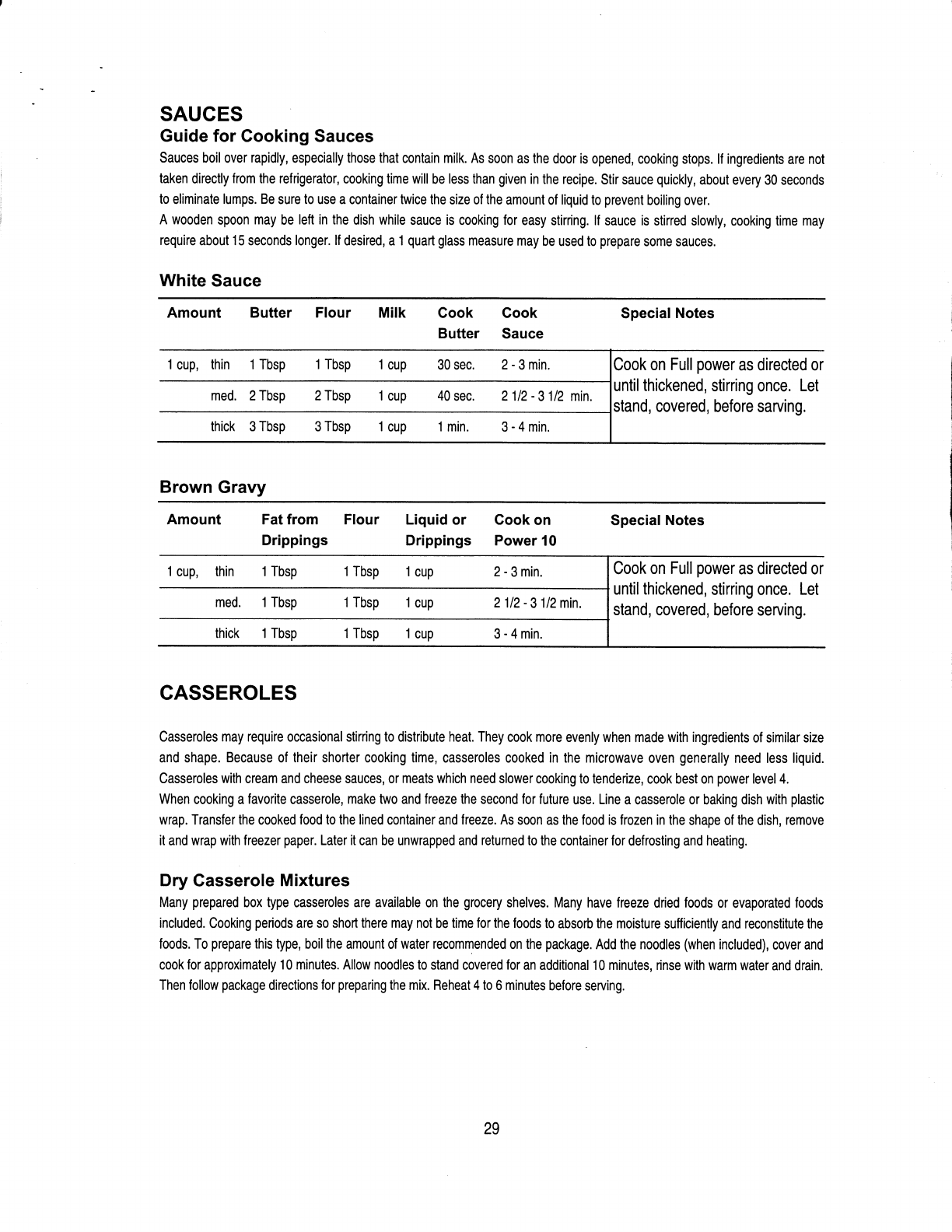
SAUCES
Guide for Cooking Sauces
Sauces boil over rapidly, especially those that contain milk. As soon as the door is opened, cooking stops. ll ingredients are not
taken directly from the refrigerator, cooking time will be less than given in the recipe. Stir sauce quickly, about every 30 seconds
to eliminate lumps. Be sure to use a container twice the size of the amount ol liquid lo prevent boiling over.
A wooden spoon may be left in the dish while sauce is cooking for easy stining. lf sauce is stined slowly, cooking time may
require about 1 5 seconds longer. ll desired, a 1 quart glass measure may be used to prepare some sauces.
White Sauce
Amount Butter Flour Mitk Cook Cook
Butter Sauce
1 cup, thin 1 Tbsp 1 Tbsp 1 cup 30 sec. 2 - 3 min.
med. 2 Tbsp 2 Tbsp 1 cup 40 sec. 2112 - 3112
3 Tbsp 3 Tbsp 1 cup 1min. 3-4 min.
Brown Gravy
Special Notes
Cook on Full power as directed or
until thickened, stirring once. Let
stand, covered, before sarving.
Amount
1 cup,
Fat from Flour
Drippings
Liquid or Gook on
Drippings Power 10
1 Tbsp 1 cup 2 - 3 min.
Special Notes
Cook on Full power as directed or
until thickened, stirring once. Let
stand, covered, before serving.
1 Tbsp
med. 1 Tbsp 1 Tbsp 1 cup 2112-3112nin.
1 Tbsp 1 Tbsp 1 cup 3-4min.
CASSEROLES
Casseroles may require occasional slirring to distribute heat. They cook more evenly when made with ingredients ol similar size
and shape. Because of lheir shorter cooking time, casseroles cooked in the microwave oven generally need less liquid.
Casseroles with cream and cheese sauces, or meats which need slower cooking to tenderize, cook best on power level 4.
When cooking a lavorite casserole, make two and freeze the second for future use. Line a casserole or baking dish with plastic
wrap. Transfer the cooked food to the lined container and freeze. As soon as the food is lrozen in the shape ol the dish, remove
it and wrap with lreezer paper. Later it can be unwrapped and retumed to the container for defrosting and healing.
Dry Gasserole Mixtures
Many prepared box type casseroles are avaihbb on the grocery shelves. Many have lreeze dried loods or evaporated foods
included. Cooking periods are so short there may not be time lor the foods to absorb the moisture sufficiently and reconstitute the
foods. To prepare this type, boil the amount of water recommended on the package. Add the noodles (when included), cover and
cook for approximately 10 minutes. Allow noodles to stand covered for an additional 10 minutes, rinse with warm water and drain.
Then lollow package directions for preparing the mix. Reheat 4 to 6 minutes before serving.
29
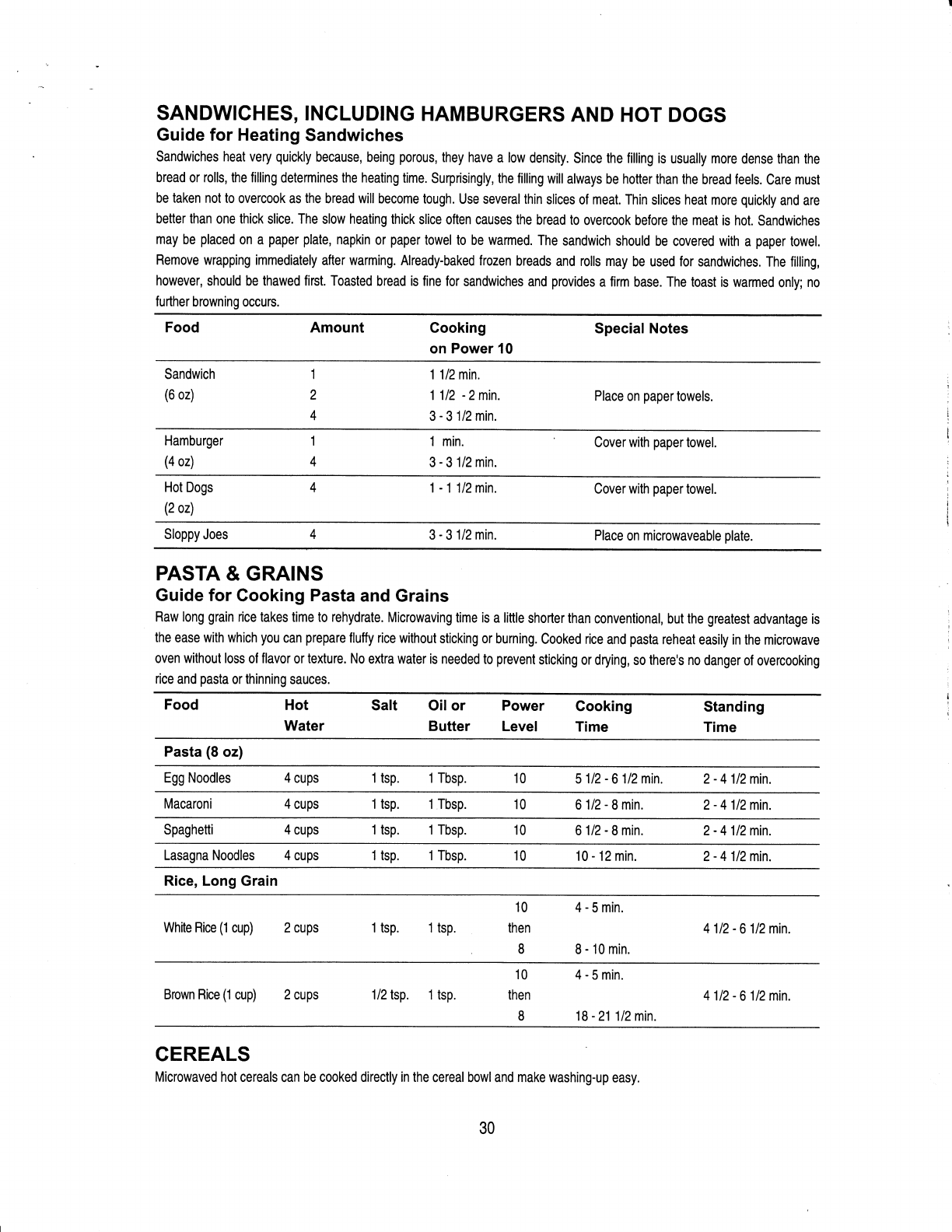
SANDWICHES, INCLUDING HAMBURGERS AND HOT DOGS
Guide for Heating Sandwiches
Sandwiches heat very quickly because, being porous, they have a low density. Since the filling is usually more dense than the
bread or rolls, the lilling determines the heating time. Surprisingly, the filling will always be hotter than the bread feels. Care must
be taken not to overcook as the bread will become tough. Use sevenal thin slices ol meat. Thin slices heat more quickly and are
better lhan one thick slice. The slow heating thick slice often causes the bread to overcook before the meat is hot. Sandwiches
may be placed on a paper plate, napkin or paper towel to be warmed. The sandwich should be mvered with a paper towel.
Remove wrapping immediately after warming. Already-baked frozen breads and rolls may be used for sandwiches. The filling,
however, should be thawed first. Toasted bread is fine for sandwiches and provides a firm base. The toast is warmed only; no
further browning occurs.
Food Amount Cooking
on Power 10
Special Notes
Sandwich 1 1 1l2min.
(6 oz) 2 1112 -2nin. Place on papertowels.
4 3-31l2min.
Hamburger 1
$oz) 4
1 min. Cover with paper towel.
3 - 3 1l2min.
Hot Dogs
(2 oz)
1 - 1 1l2min. Cover with paper towel.
Sloppy Joes 43 - 3 1l2min. Place on microwaveable plate.
PASTA & GRAINS
Guide for Cooking Pasta and Grains
Raw long grain rice takes time to rehydrale. Microwaving time is a little shorter than conventional, but the greatesl advantage is
the ease with which you can prepare flufly rice without sticking or burning. Cooked rice and pasta reheat easily in the microwave
oven without loss of llavor or lexture. No extra water is needed to prevent sticking or drying, so lhere's no danger of overcooking
rice and pasta or thinning sauces,
Food Hot Salt Oilor Power Gooking Standing
Water Butter Level Time Time
Pasta (8 oz)
Egg Noodles 4cups 1 tsp. 1Tbsp. 10 51/2-61/2 min. 2-41l2min.
Macaroni 4cups 1tsp. 1Tbsp. 10 61/2-Bmin. 2-41l2min.
Spaghetti 4cups 1tsp. 1Tbsp. 10 61/2-8min. 2-41l2min.
LasagnaNoodles 4cups 1tsp. 1Tbsp. 10 10-12min. 2-41l2min.
Rice, Long Grain 10 4-5min.
WhiteRice(1cup) 2cups 1tsp. 1tsp. then 4112-61l2min.
. 8 8-10min.
10 4-5min.
BownRice(1cup) 2cups 1/2tsp. 1tsp. then 4112-61l2nin.
8 18 -21112min.
CEREALS
Microwaved hot cereals can be cooked directly in the cereal bowl and make washing-up easy.
30
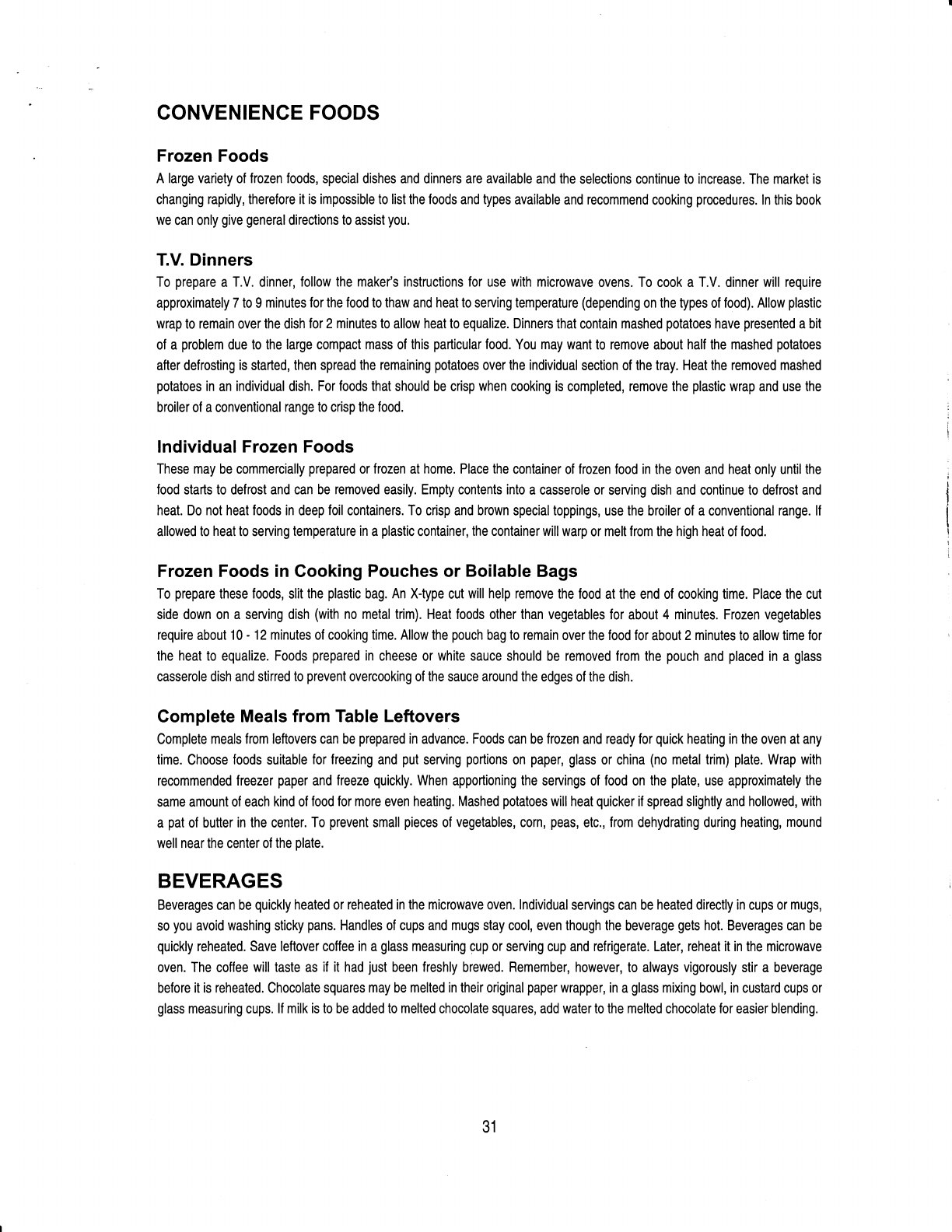
CONVENIENCE FOODS
Frozen Foods
A large variety ol frozen foods, special dishes and dinners are available and the selections continue to increase. The market is
changing rapidly, therelore it is impossible lo lisl the loods and lypes available and recommend cooking procedures. ln this book
we can only give general directions to assist you.
T.V. Dinners
To prepare a T.V. dinner, lollow the make/s instructions for use with microwave ovens. To cook a T.V. dinner will require
approximately 7 to 9 minutes lor the food to thaw and heat to serving temperature (depending on the types of lood). Allow plastic
wrap to remain over the dish lor 2 minutes lo allow heat to equalize. Dinners that contain mashed potatoes have presented a bit
ol a problem due to the large compact mass ol this particular food. You may want to remove about half the mashed potatoes
after defrosting is slarted, then spread the remaining potatoes over the individual seclion of the tray. Heat the removed mashed
potatoes in an individual dish. For foods that should be crisp when cooking is completed, remove the plastic wrap and use the
broiler ol a conventional range to crisp the food.
lndividual Frozen Foods
These may be commercially prepared or frozen at home. Place the container of frozen lood in the oven and heat only until the
lood starts to delrost and can be removed easily. Empty contents into a casserole or serving dish and continue to delrost and
heat. Do not heat loods in deep foil containers. To crisp and brown special toppings, use the broiler of a conventional range. ll
allowed to heat lo serving temperature in a plastic container, the container will warp or melt from the high heat of food.
Frozen Foods in Cooking Pouches or Boilable Bags
To prepare lhese foods, slit the plaslic bag. An X-type cut will help remove the food at the end of cooking time. Place the cut
side down on a serving dish (with no metal trim). Heat foods other lhan vegetables for about 4 minutes. Frozen vegetables
require about 10 - 12 minutes of cooking time. Allow the pouch bag to remain over lhe lood for about 2 minutes to allow time for
the heat to equalize. Foods prepared in cheese or white sauce should be removed from the pouch and placed in a glass
casserole dish and stirred to prevent overcooking ol the sauce around the edges of the dish.
Gomplete Meals from Table Leftovers
Complete meals lrom leftovers can be prepared in advance. Foods can be frozen and ready for quick heating in the oven at any
time. Choose loods suitable lor lreezing and put serving portions on paper, glass or china (no metal trim) plate. Wrap with
recommended freezer paper and freeze quickly. When apportioning the servings of food on the plate, use approximately the
same amount of each kind ol food for more even heating. Mashed potatoes will heal quicker if spread slightly and hollowed, with
a pat of butter in the center. To prevent small pieces of vegetables, corn, peas, etc., from dehydrating during heating, mound
well near the center ol lhe plate.
BEVERAGES
Beverages can be quickly heated or reheated in the microwave oven. lndividual servings can be heated directly in cups or mugs,
so you avoid washing sticky pans. Handles ol cups and mugs stay cool, even though the beverage gets hot. Beverages can be
quickly reheated. Save leftover colfee in a glass measuring cup or serving cup and refrigerate. Later, reheat it in the microwave
oven. The coflee will taste as if it had just been freshly brewed. Remember, however, lo always vigorously stir a beverage
before it is reheated. Chocolate squares may be melted in their original paper wrapper, in a glass mixing bowl, in custard cups or
glass measuring cups. lf milk is lo be added to melted chocolate squares, add water to the melted chocolate lor easier blending.
31
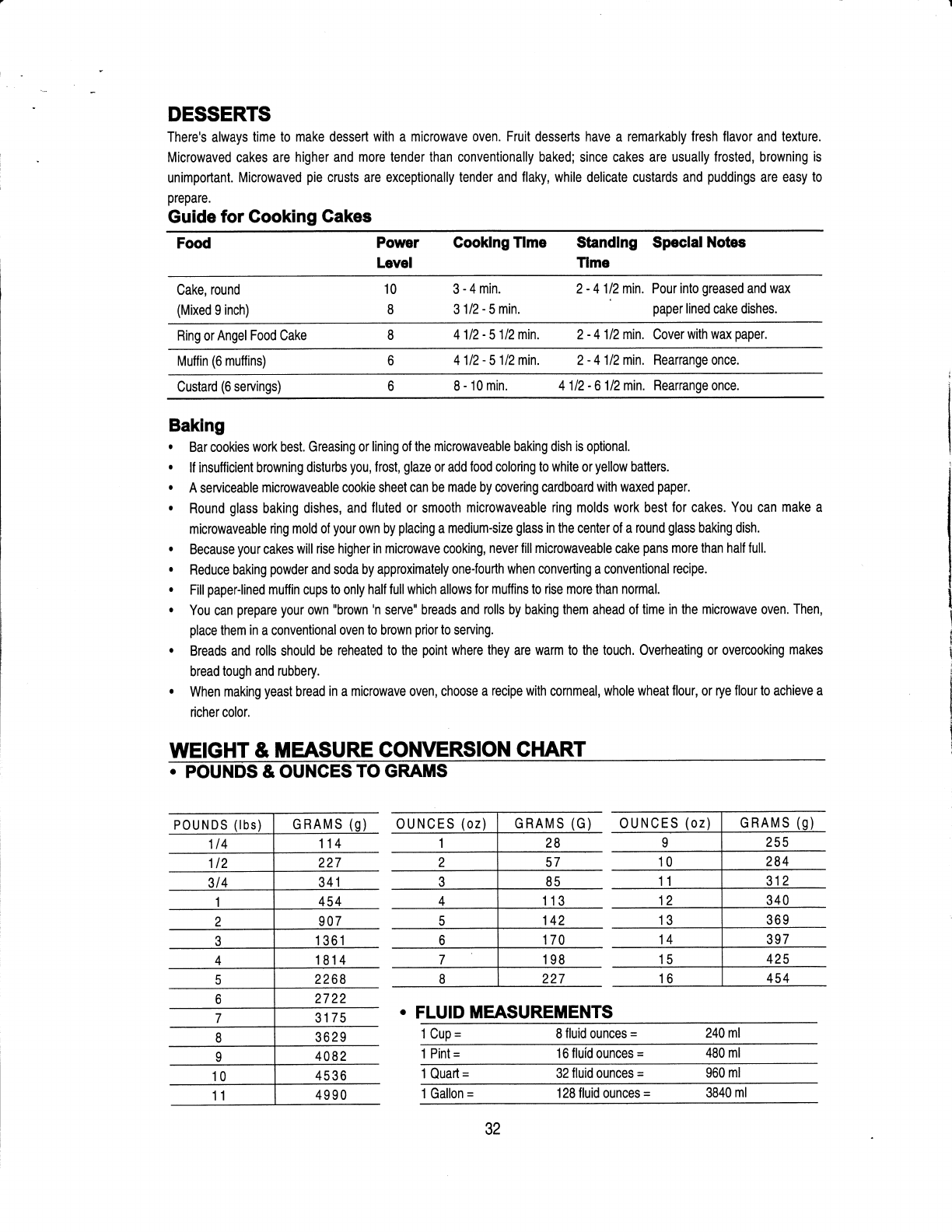
DESSERTS
There's always time to make dessert with a microwave oven. Fruit desserts have a remarkably lresh flavor and texture.
Microwaved cakes are higher and more tender than conventionally baked; since cakes are usually frosted, browning is
unimportant. Microwaved pie crusts are exceptionally tender and flaky, while delicale custards and puddings are easy to
prepare.
Gulde for Gooking Gakes
Food Power
Level
Gooklng TIme Standlng Speclal Notes
Tlme
Cake, round
(Mixed 9 inch)
10
8
3 - 4 min.
3112 - 5 min.
2 - 41/2 min. Pour into greased and wax
paper lined cake dishes.
Ring or Angel Food Cake 4112-5112min. 2 - 4 112 min. Cover with wax paper.
Muffin (6 muffins) 4112-5112ntn. 2 - 4 112 nin. Rearrange once.
Custard (6 seruings) 8 - 10 min. 4 112- 6 1 12nin. Rearrange once.
Baking
. Bar cookies work best. Greasing or lining of the microwaveable baking dish is optional.
o
a
O
O
ll insufficient browning disturbs you, frost, glaze or add lood coloring to white or yellow batters.
A serviceable microwaveable cookie sheet can be made by covering cardboard with waxed paper.
Round glass baking dishes, and lluted or smooth microwaveable ring molds work best for cakes. You can make a
microwaveable ring mold of your own by placing a medium-size glass in the center of a round glass baking dish.
Because your cakes will rise higher in microwave cooking, never lill microwaveable cake pans more than half lull.
Reduce baking powder and soda by approximately one-fourlh when converting a conventional recipe,
Fill paper-lined muflin cups to only half full which allows lor muffins to rise more than normal.
You can prepare your own "brown 'n serve" breads and rolls by baking them ahead of time in the microwave oven. Then,
place them in a conventional oven to brown prior to serving.
Breads and rolls should be reheated to the point where they are warm to the touch. Overheating or overcooking makes
bread tough and rubbery.
When making yeast bread in a microwave oven, choose a recipe with commeal, whole wheat flour, or rye llour to achieve a
richer color.
WEIGHT & MEASURE CONVERSION CHART
O POUNDS & OUNCES TO GRAMS
. FLUID MEASUREMENTS
l CuP= 8 fluid ouflcos =240 ml
1 Pint =16 fluid ourcos =480 ml
1 Quaft =32 fluid ouhcos =960 ml
OUNCES OUNCES
1 Gallon =
32
128 fluid ouhcos =3840 ml
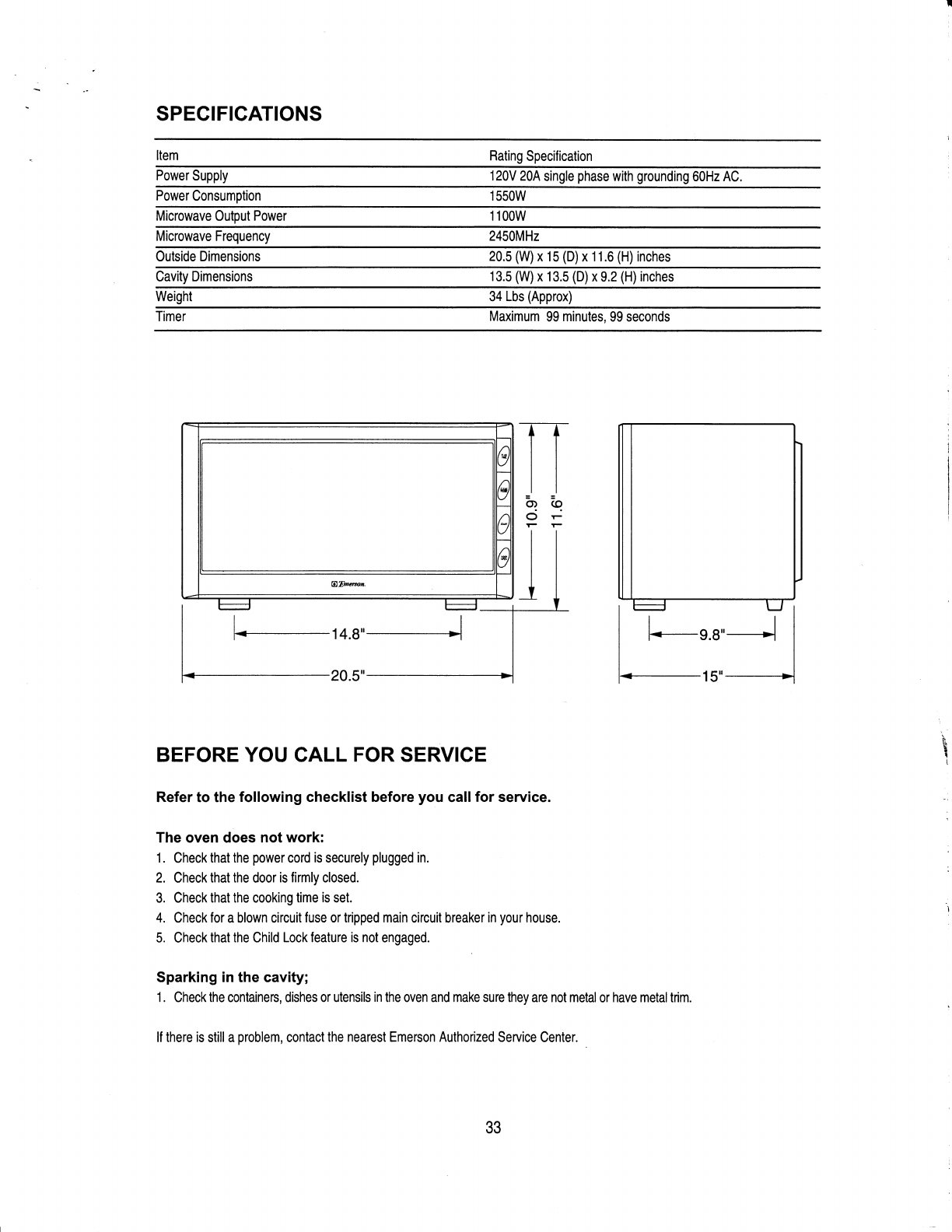
SPEGIFIGATIONS
Item Rating Specification
Power Supply 120V 20A single phase with grounding 60Hz AC.
Power Consumption 1 550W
Microwave Output Power 1100w
Microwave Frequency 2450MHz
Outside Dimensions 20.5 (W) x 15 (D) x 1 1 .6 (H) inches
Cavity Dimensions 13.5 (W) x 13.5 (D) x 9.2 (H) inches
Weight 34 Lbs (Approx)
Timer Maximum 99 minutes, 99 seconds
[-g.8,,-J
BEFORE YOU CALL FOR SERVICE
Refer to the following checklist before you call for service.
The oven does not work:
1. Check that the power cord is securely plugged in.
2. Check that the door is lirmly closed.
3. Check that the cooking time is set.
4. Check for a blown circuit fuse or tripped main circuit breaker in your house.
5. Check that the Child Lock feature is not engaged.
Sparking in the cavity;
1. Check the containers, dishes or utensils in the oven and make sure they are not metal or have metal trim.
ll there is still a problem, contact the nearest Emerson Authorized Service Center.
+15"
33
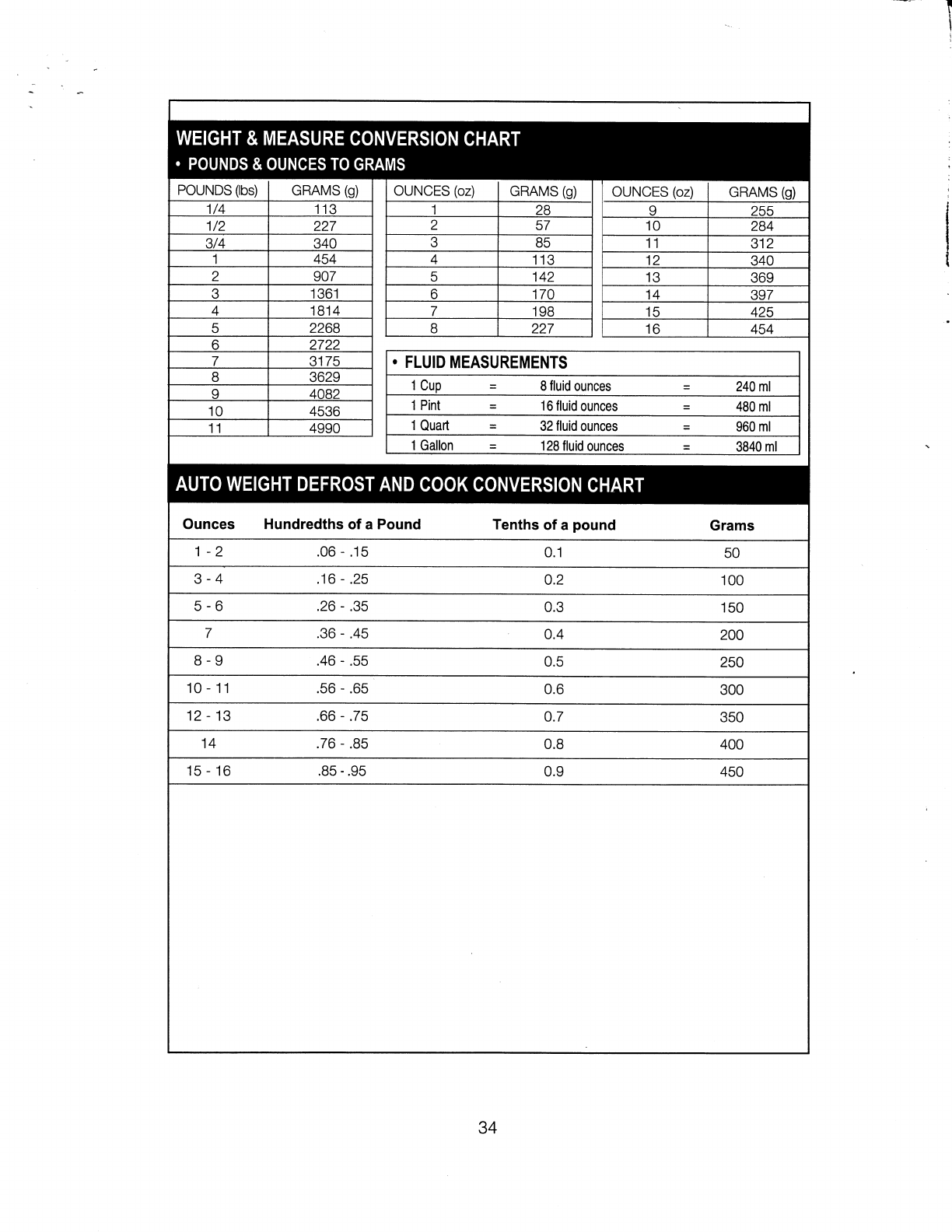
POUNDS (lbs) I GRAMS (g)
O FLUID MEASUREMENTS
1 Cup = 8 fluid ounces = 240 ml
1 Pint = 16 fluid ounces = 480 ml
1 Quart = 32 fluid ounces = 960 ml
1 Gallon = 128 fluid ounces = 3840 ml
OUNCES (oz) | GRAMS (g) OUNCES (oz) I GRAMS (g)
Ounces Hundredths of a Pound Tenths of a pound
1-2 .06-.15
0.2 100
0.3 150
.36 - .45 0.4
0.5 250
0.6 300
0.7 350
0.8 400
0.9 450
34